
Everything Happens for a Reason: And Other Lies I've Loved
by
Kate Bowler
Published 6 Feb 2018
Because of my background in the prosperity gospel, I receive hundreds of letters from those inside the movement. These are people who, crushed by the weight of solution-focused theology, have been unable to grieve. A Nigerian woman sits through weekly meetings at her job encouraging her to “talk faith-talk,” but she wants to acknowledge that, outside her office window, the bodies of abandoned babies are being collected and hauled away in black refuse bags. A bitter seed has been planted in a young father who must take his brain-dead child off life support while his extended family, steeped in prosperity theology, rails against him for his inability to prevent his child’s death.
…
They wanted a modicum of power over the things that ripped their lives apart at the seams. The prosperity gospel is a theodicy, an explanation for the problem of evil. It is an answer to the questions that take our lives apart: Why do some people get healed and some people don’t? Why do some people leap and land on their feet while others tumble all the way down? Why do some babies die in their cribs and some bitter souls live to see their great-grandchildren? The prosperity gospel looks at the world as it is and promises a solution. It guarantees that faith will always make a way. I would love to report that what I found in the prosperity gospel was something so foreign and terrible to me that I was warned away.
…
“It works, honey,” said Valerie, a polished businesswoman and an endlessly patient answerer of questions about all things prosperity. “It really works! Just look at yourself!” I broke into a wide smile. I was studying the prosperity gospel, but that day I was the prosperity gospel. I had become living proof, at last. We have words to evaluate how likely it is that our attempts to harness the supernatural are of any use. Black cats and ladders and spilling the salt are put in a box dubbed superstition, and failed prophecies are classified as fantasies or delusions. But the prosperity gospel asks you to set aside your doubts and bet it all on God’s supernatural power to reach down and remake the world according to your prayer.
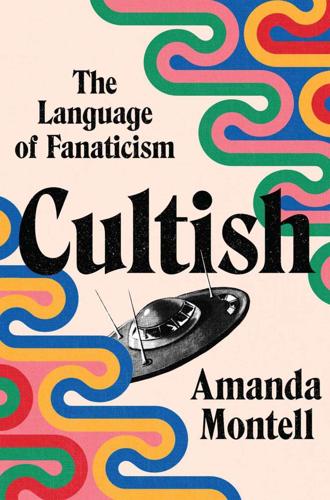
Cultish: The Language of Fanaticism
by
Amanda Montell
Published 14 Jun 2021
(In 2019, a federal judge ruled that Trump and his three children could be sued for fraud in connection with these organizations.) To return DeVos’s favors, these presidents all publicly lauded Amway and the Direct Selling Association in general as a commendable, profoundly patriotic enterprise.* Rich DeVos’s seventeenth-century interpretation of prosperity theology suggests that if you are not rich, then God does not love you. As he declared, “The free-enterprise system . . . is a gift of God to us, and we should understand it, embrace it, and believe in it.” According to DeVos, if you feel as though you’ve been shut out of the system your whole life, then you’d be an imbecile not to give up on bureaucracy and turn to an MLM.
…
The business had been founded about a decade earlier by William Penn Patrick, the single most snake-oil-y gasbag of all the direct sales guys I’ve come across. Based in Northern California, this dude was a tightass wannabe Republican senator in his thirties whom the Los Angeles Times once called the state’s “strangest politician.” Like most other MLM founders, Patrick was big on prosperity theology and New Thought, and he was famous for turning inspirational mottoes minacious: “Tell [recruits] they’re going to be happier, healthier, wealthier, and receive what they want out of life with the Holiday Magic program,” he wrote, adding in the same pen stroke, “Any person who fails in the Holiday Magic program must fall into one of the following categories: lazy, stupid, greedy, or dead.”
…
Throughout the mid-twentieth century, the message that happy thoughts and a healthy ego could make you rich swept America’s churches. The Power of Positive Thinking was written by the famous minister Norman Vincent Peale, who ran a conservative Protestant church in New York City called Marble Collegiate. There, Peale preached the “prosperity gospel” to a congregation of mostly wealthy, influential Manhattanites—including, and especially, a young Donald Trump. (By no coincidence, Trump grew up to become a hard-core MLM enthusiast.) Known for his inspiring self-help oratory, Peale evangelized sentiments like “Empty pockets never held anyone back.
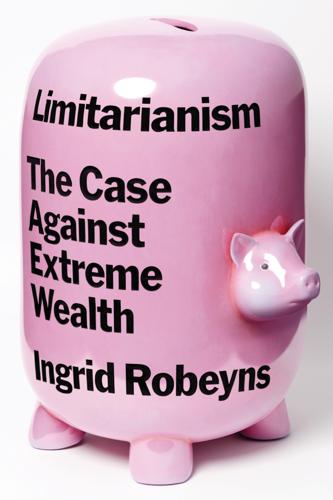
Limitarianism: The Case Against Extreme Wealth
by
Ingrid Robeyns
Published 16 Jan 2024
For accounts of the earliest neoliberal thinkers and their networks, active from the 1930s onward, see Philip Mirowski and Dieter Plehwe (eds), The Road from Mont Pèlerin: The Making of the Neoliberal Thought Collective, second edition, with a new preface (Cambridge, MA: Harvard University Press, 2015). 11. On prosperity theology, see britannica.com/topic/prosperity-gospel and Tara Isabella Burton, “The Prosperity Gospel, Explained: Why Joel Osteen Believes That Prayer Can Make You Rich,” VOX, September 1, 2017, vox.com/identities/2017/9/1/15951874/prosperity-gospel-explained-why-joel-osteen-believes-prayer-can-make-you-rich-trump. 12. Jens Beckert, “Durable Wealth: Institutions, Mechanism, and Practices of Wealth Perpetuation,” Annual Review of Sociology 48 (2022), pp. 233–55.
…
In other words, one of the reasons why some super-rich people feel the government should stay small is a stunningly deep-seated, class-based prejudice that informs how they regard themselves, and how they regard the poor. They think of themselves as the rightful leaders, as evidenced by the fact that they are rich. Some, such as the adherents of prosperity theology, go a step further, and, backed up by a skewed interpretation of Protestant doctrine, believe that their wealth shows their high degree of moral worthiness. Most of them think that the poor are to be blamed for their own predicament, making them unfit to decide on policy. And, they believe, since governments are democratically elected and therefore run by the population rather than the smart elite, they should not be trusted with solving society’s problems.
…
How Lies, Loopholes and Lobbyists Make the Rich Even Richer 69, 127, 169 pensions xix, 13, 92, 170, 183 philanthropy 53, 92, 114, 164–86 crowdfunding 178 crowding out effect 176 democracy and 175–9 dirty money and 166 discovery argument 177–8 donation level 184–6 effective altruism movement 179 efficiency and 170–1 Feeney and xxiii, 164–7, 218 Good Ancestor Movement 183, 192 government and 167–79, 181 pluralism argument 177 power asymmetry and 179 principled justification 176 “rules”/blueprints for dynastic wealth and 172 small donors 181 structural change and 180 tax and 164, 166–8, 172, 173, 175–6, 180, 186 Piketty, Thomas: Le Capital au XXle siecle, or Capital in the Twenty-First Century 2, 21, 27, 97, 107, 226 Pizzigati, Sam: The Case for a Maximum Wage 224 platform economy 210 Plato: The Laws 189 pluralism argument 177 Politkovskaya, Anna 50 political limit xix, 15–16, 25, 116, 126, 161, 228 Polk, Sam 198 polluter pays principle 103–4, 106 Polman, Paul 86 populism 190 Porter, Henry 87 poverty China, decline in poverty in 2, 20 climate change and 79, 97, 114 Covid–19 pandemic (2020–22) and 18 definition of 149–50 developing countries and 29 elimination of xv, 36 entrepreneurs and 91 extreme 2, 18–20, 48, 79, 140, 141, 149, 153 globalization and 20–24 importance of 36–7 income/basic income and 150–52 inequality and xii, 35–7 instrumental/intrinsic importance of 36 kleptocracy and 47, 49 levels of 2, 18–23 line 10–11, 13, 19–20, 115, 146–7, 150 London living standards and 10–11 Oxfam report on inequality and 3, 17 pensions and 13 philanthropy and 168, 176 “relative poverty” measure 36 rich economies and 155 richest people worldwide, distribution of and 24 “self-made” rich and 5 USA distribution of wealth and 26–27 power asymmetry 179 Primark 58 principled justification 176 private jets 11, 101, 103, 115 profits 9, 23, 35, 42, 43, 45, 46, 47, 54, 70, 88, 92, 93 climate change and 97–8, 101, 103–4, 106, 114 Davos Men and 92, 93 dirty money and 43, 54 entrepreneurs and 133–7 fair division of 59 historic crimes and 46 neoliberalism and 35 non-profit organization xxiii, 177, 211 profit margins 157 profit-maximizing 88, 156, 170 “profits before people” philosophy 57 profit-seeking 9, 170, 209, 211 shifting 66 tax and 65–7, 124, 145, 160, 161, 222 propaganda 89, 180 property 4, 13, 48, 149 climate change and 99 inheritance and 124 Plato on limits to 189 private xx, 208, 209 property-owning democracy 213 public property transferred to private sector 209 rights 119–20 as social institution 118 tax 70, 118–20 prosperity theology 173 Protestant doctrine 173 public goods xx, 14, 34, 68, 119, 137, 146, 163, 168, 177, 209, 211 public–private partnerships 42, 103, 167 purchasing-power parity 19–20 Purdue Pharma 52–4 Putin, Vladimir 9, 49–50, 63, 76 quality of life 1, 14, 18, 41, 77, 146, 152, 171, 182 Quiggin, John 39–40 race 28–9, 194 racism 31, 88, 155, 174, 175, 191–2 Ramaswamy, Vivek xxv Rana Plaza disaster, Dhaka, Bangladesh (2013) 57–8 Rana Plaza Donors Trust Fund 58 Rawls, John 130 Raworth, Kate 213–4 Reagan, Ronald 33, 173 recessions xxi, 18 referenda 224 refugees 79–80, 158 regulative ideal xiv–xv, 214 Reich, Rob 32–33, 45; Just Giving 175–8 renewable energies 96, 105, 115, 158 rent-seeking 128–9 Republican Party xxv, 81, 87–8, 90 Resource Generation 8–9, 32 rich definition of 10–16 “too rich” xii, xviii, 13 See also super-rich riches line 10–16, 41, 117, 182–4, 186 rich lists ix–x, 2, 133 Romney, Mitt 169–70 Ronaldo, Cristiano 126 Roser, Max 18 Rowling, J.
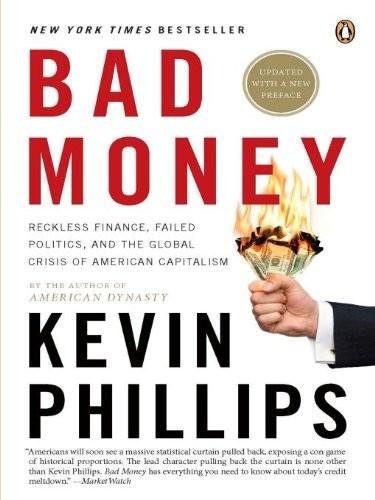
Bad Money: Reckless Finance, Failed Politics, and the Global Crisis of American Capitalism
by
Kevin Phillips
Published 31 Mar 2008
In 1989, the Ogden Standard-Examiner reported that “the cultural emphasis in the Mormon Church that equates financial success with spiritual success, and an unquestioning allegiance to authority figures, may partly explain why 10,000 Utah investors have been swindled out of more than $200 million during the last decade.”40 A topical compendium of press stories over the years turns up the following descriptions: the nation’s “stock fraud capital,” “a leading center of financial shenanigans,” and “the sewer of the securities industry.”41 Clearly, the local emphasis on finance is not altogether wholesome. It would be unfair to broadly tie Mormonism and the prosperity gospel to the gestation of Bullnomics, but it is not unfair to suggest an unfortunate cousinship between prosperity theology and the Bush administration’s unsuccessful promotion of the conservative “Ownership Society” or “Opportunity Society,” which insisted on individuals naming and claiming economic fulfillment through self-help, individual accounts, and the all-rewarding marketplace.
…
It has a bad effect there.”31 What merits “Bullnomic” attention in this arena, though, is the further evidence in 2006 and 2007 of Americans turning to success-ethic belief systems—to the “prosperity gospel” and to “name it and claim it” and “God wants you to be rich” theology. Economic hopes were imitating religious conviction. To many mainstream Christian theologians, this trend pulled Christianity further toward an unacceptable materialism. Some even found hints of blasphemy. Rick Warren, author of The Purpose-Driven Life, dismissed the prosperity gospel as “baloney: It’s creating a false idol. You don’t measure your self-worth by your net worth.”32 Arguably, though, such religion was a logical outgrowth of an angst-threaded economic consumerism, powered by incessant “be all you want to be” advertising and funded by home equity withdrawals and credit card debt, in which a relatively small population at the top reveled in a large and rising percentage of the nation’s income and wealth.
…
Pentecostalism, ten million to fifteen million strong and home to several of America’s fastest-growing denominations, was—as it had been in the twenties—the fertile seedbed of the new twenty-first-century “prosperity gospel.” If the rest of Protestantism found money a theological taboo, prosperity doctrine rose to the opportunity. It blended Pentecostal emotion over God’s gifts with the power of positive thinking and the thesis of a spiritual contract: plant a seed, make a donation, and God will repay you many times over. But in 2006 and 2007, as Americans declared less respect for U.S. institutions and high ratios identified the United States as being on the wrong track, the prosperity gospel metastasized beyond the usual Pentecostal setting. According to a fall 2006 Time cover story (“Does God Want You to Be Rich?”)
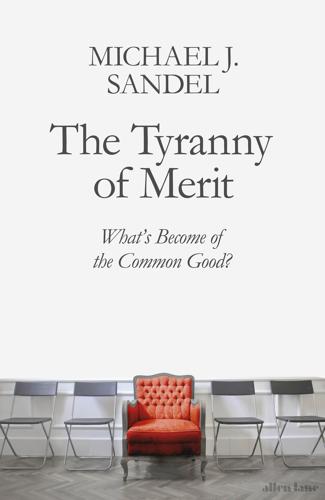
The Tyranny of Merit: What’s Become of the Common Good?
by
Michael J. Sandel
Published 9 Sep 2020
id=13167670 ; Harry Harootunian, “Why the Japanese Don’t Trust Their Government,” Le Monde Diplomatique , April 11, at mondediplo.com/2011/04/08japantrust . 34. Kenyon quoted in Kate Bowler, “Death, the Prosperity Gospel and Me,” The New York Times , February 13, 2016. See also Kate Bowler, Blessed: A History of the American Prosperity Gospel (New York: Oxford University Press, 2013). 35. Bowler, “Death, the Prosperity Gospel and Me.” 36. Osteen quoted in Bowler, ibid. 37. David Van Biema and Jeff Chu, “Does God Want You to Be Rich?” Time , September 10, 2006. 38. Bowler, “Death, the Prosperity Gospel and Me.” 39. Bowler, Blessed , p. 181; polling data in Biema and Chu, “Does God Want You to Be Rich?”
…
“We need a tsunami to wipe out egoism, which has rusted onto the mentality of Japanese over a long period of time,” he said. 33 HEALTH AND WEALTH In recent decades, American Christianity has produced a buoyant new variant of providentialist faith called the prosperity gospel. Led by televangelists and preachers in some of the country’s biggest megachurches, it teaches that God rewards faith with wealth and health. Far from conceiving grace as a mysterious, unearned gift of God, the prosperity gospel emphasizes human agency and will. E. W. Kenyon, an early-twentieth-century evangelist who laid the groundwork for the movement, urged Christians to proclaim: “God’s ability is mine. God’s strength is mine. His success is mine. I am a winner. I am a conqueror.” 34 Kate Bowler, a historian of the prosperity gospel, writes that its teaching is summarized in the phrase “I am blessed,” where the evidence of being blessed is being healthy and wealthy. 35 Joel Osteen, a celebrity prosperity evangelist whose Houston church is the largest in America, told Oprah Winfrey that “Jesus died that we might live an abundant life.” 36 His bestselling book offers examples of the blessings that flow from faith, including the mansion in which he lives and the time he was upgraded to business class on a flight. 37 It might seem that a gospel of blessedness would prompt humility in the face of good fortune, rather than the meritocratic conviction that health and wealth are signs of virtue.
…
It is a perfect word for an American society that says it believes the American dream is based on hard work, not luck. 38 Although about one million Americans attend megachurches that preach the prosperity gospel, its resonance with the American faith in striving and self-help give it a broader influence. A Time magazine poll found that nearly a third of American Christians agree that “if you give your money to God, God will bless you with more money,” and 61 percent believe that “God wants people to be prosperous.” 39 By the early twenty-first century, the prosperity gospel, with its appeal to hard work, upward mobility, and positive thinking, was hard to distinguish from the American dream itself.

The Undertow: Scenes From a Slow Civil War
by
Jeff Sharlet
Published 21 Mar 2023
Peale’s “positivity” has diluted into the air of the American myth of the businessman-redeemer. It was what Trump transmitted; what his followers received, though, was shaped for believers and unbelievers alike by the prosperity gospel that surpassed Peale. Peale’s message resonated in its time most with the affluent—those, like Trump himself, who saw themselves as winners. The prosperity gospel recasts the same promise to those, like Trump’s followers, who feel lost. On the surface, the prosperity gospel is a simple transaction. It begins with a kind of sales demonstration, a preacher who shows you his wealth as evidence of his anointing. He’s blessed; and you can be too.
…
The usual way: You give him your money. Only, your money is just a metaphor for your faith, and the good news promised by the prosperity gospel is that faith will be repaid in kind. “Miracles” will release you from the bondage of debt or obliterate the tumor you didn’t even know was forming within you. The Christian Right that has so long dominated the political theology of the United States emphasizes a heavenly reward for righteousness in faith and behavior; the prosperity gospel is about what Peale might call “amazing results” you can measure and count. The old political theology was about the salvation to come; the Trump religion was about deliverance, here and now.
…
For the perfectly named Creflo Dollar, one of the following generation’s most popular prosperity preachers, it was the $65 million Gulfstream G650, for which his ministry asked its followers to make donations and “love offerings.” Roberts was White; Dollar is Black. What the prosperity gospel offered as a model for the followers of Trump was what they imagined was a means for transcending race: colorblindness. Pastor Mark Burns, a Black prosperity-gospel minister from South Carolina, explained it this way in his opening prayer for Trump in Indiana: “It’s horrible, horrible, how they’re trying their best to make sure you and I focus on race and our color, and not the only true color that matters!”

Brazillionaires: The Godfathers of Modern Brazil
by
Alex Cuadros
Published 1 Jun 2016
Or rather, let us say, love of glory. —MACHADO DE ASSIS, Memórias Póstumas de Brás Cubas (trans. William Grossman) Contents PROLOGUE: THE CRASH PART ONE: ROOTS OF WEALTH CHAPTER 1: GOD IS BRAZILIAN CHAPTER 2: THE PRICE OF PROGRESS CHAPTER 3: MANIFEST DESTINY CHAPTER 4: NATION BUILDING CHAPTER 5: PROSPERITY GOSPEL PART TWO: THE BRAZILIAN DREAM CHAPTER 6: VISIONARY CHAPTER 7: HELPING HANDS CHAPTER 8: THE PROFIT MOTIVE CHAPTER 9: THE BACKLASH CHAPTER 10: TOO BIG TO FAIL EPILOGUE: AFTER THE CRASH ACKNOWLEDGMENTS NOTES GLOSSARY INDEX PROLOGUE THE CRASH ON A STRETCH OF HIGHWAY NOT FAR FROM RIO DE JANEIRO, a silver SLR McLaren idled on the shoulder, its futuristic door hinged open at the top like a wing extended toward the evening sky.
…
In the past you’d be embarrassed to say you were from Alemão. The name conjured some kind of postapocalyptic zone, so you’d say you were from a neighboring area. That had changed now, not because of the UPPs but because of Globo. People started announcing it: I’m from Alemão—you know, like the novela. CHAPTER 5 PROSPERITY GOSPEL THE BISHOP, HIS NETWORK, AND THE OUTSIDER TRADITION “From the point of view of my faith in the Lord Jesus, I am the richest man on the planet.” —EDIR MACEDO ($1.2 BILLION) IF GLOBO ISN’T AS POWERFUL AS IT USED TO BE, ONE REASON IS a Pentecostal pastor named Edir Macedo, founder of the Universal Church of the Kingdom of God.
…
As the owner of the country’s number-two TV network, he had a net worth of $1.2 billion—but was unlike any other billionaire I’d studied up to now. He didn’t come from the traditional elites. He was an enemy of Globo. In the end, he would expand my sense of what a billionaire could be. Macedo preaches the prosperity gospel, which is the idea that your faith in God will bring you financial success. The message never really changes from one sermon to the next, but the way he tells it is always captivating. He’s a bald little man but his charisma transforms him into a giant. One day in the inland city of Belo Horizonte, at one of the ten thousand churches he has across Brazil, he asked, “Which is the largest country in the world, economically speaking?”
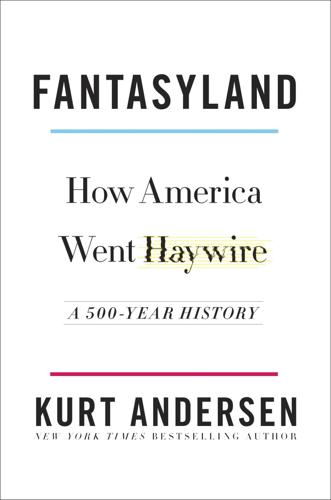
Fantasyland: How America Went Haywire: A 500-Year History
by
Kurt Andersen
Published 4 Sep 2017
Copeland found God, enrolled at the new Oral Roberts University in Tulsa, became Oral’s chauffeur and pilot, and finally emerged as a godfather of what became known in the 1980s as the prosperity gospel. A key passage for prosperity gospel preachers is the line by Jesus in Mark 11:24—“What things soever ye desire, when ye pray, believe that ye receive them, and ye shall have them.” Of course, ironically, absurdly, it goes unmentioned that this comes just a few lines after the scene where Jesus performs his great act of militant anticommercialism, condemning and ransacking the tables of the moneychangers and salesmen in the Temple. Prosperity gospel ministers, Olson says, are promoting an idea of prayer that “makes God into a cosmic slot machine and turns salvation into a self-centered acquisition of physical blessings.”
…
America spent a century making Santa Claus its central Christmas character because he wasn’t a religious figure and adults could wink-wink pretend he was real; the new prosperity gospel makes God a real Santa in whom Christian adults actually believe. At eighty, Ken Copeland still operates his nondenominational Christian multimedia empire, with hundreds of affiliated churches, out of Fort Worth, near the Kenneth Copeland Airport. The prosperity gospel megastar, Joel Osteen, also attended Oral Roberts University, but he’s the very model of a modern major fantasy-monger—a young fifty-four, extremely fit, great-looking, stylishly dressed, always smiling, apparently sweet-tempered, well-spoken, a charismatic Christian who’s also charismatic in the ordinary sense, totally ready for prime time.
…
Graham mainstreamed evangelical Christianity by going lite, ratcheting back the anger, and Osteen goes further. He avoids involvement in political issues, but he’s delivered the prayers in the U.S. Senate and House chambers and at the Texas inaugurations of a (lesbian) Democratic mayor and a (right-wing) Republican governor. He seldom talks about Hell. “I get grouped into the prosperity gospel and I never think it’s fair,” Osteen says. “What it connotates [sic] is that you just talk about money….I never preach that whatever you say, you can get—‘I want five Cadillacs.’ ” No, but: “I do believe…that God wants us to prosper.” So “when you pray big it shows God that, ‘God I trust you,’ ” and conversely “if you pray small, ordinary prayers, then you’ll live a small, ordinary life,” because God will figure you’re a loser.
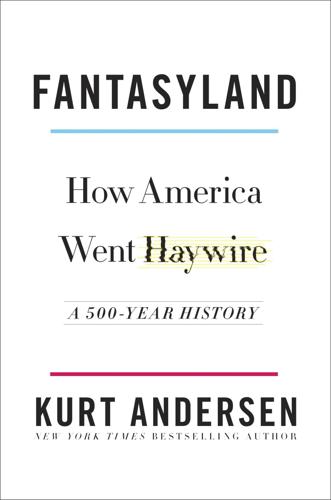
Fantasyland
by
Kurt Andersen
Published 5 Sep 2017
Copeland found God, enrolled at the new Oral Roberts University in Tulsa, became Oral’s chauffeur and pilot, and finally emerged as a godfather of what became known in the 1980s as the prosperity gospel. A key passage for prosperity gospel preachers is the line by Jesus in Mark 11:24—“What things soever ye desire, when ye pray, believe that ye receive them, and ye shall have them.” Of course, ironically, absurdly, it goes unmentioned that this comes just a few lines after the scene where Jesus performs his great act of militant anticommercialism, condemning and ransacking the tables of the moneychangers and salesmen in the Temple. Prosperity gospel ministers, Olson says, are promoting an idea of prayer that “makes God into a cosmic slot machine and turns salvation into a self-centered acquisition of physical blessings.”
…
America spent a century making Santa Claus its central Christmas character because he wasn’t a religious figure and adults could wink-wink pretend he was real; the new prosperity gospel makes God a real Santa in whom Christian adults actually believe. At eighty, Ken Copeland still operates his nondenominational Christian multimedia empire, with hundreds of affiliated churches, out of Fort Worth, near the Kenneth Copeland Airport. The prosperity gospel megastar, Joel Osteen, also attended Oral Roberts University, but he’s the very model of a modern major fantasy-monger—a young fifty-four, extremely fit, great-looking, stylishly dressed, always smiling, apparently sweet-tempered, well-spoken, a charismatic Christian who’s also charismatic in the ordinary sense, totally ready for prime time.
…
Graham mainstreamed evangelical Christianity by going lite, ratcheting back the anger, and Osteen goes further. He avoids involvement in political issues, but he’s delivered the prayers in the U.S. Senate and House chambers and at the Texas inaugurations of a (lesbian) Democratic mayor and a (right-wing) Republican governor. He seldom talks about Hell. “I get grouped into the prosperity gospel and I never think it’s fair,” Osteen says. “What it connotates [sic] is that you just talk about money….I never preach that whatever you say, you can get—‘I want five Cadillacs.’ ” No, but: “I do believe…that God wants us to prosper.” So “when you pray big it shows God that, ‘God I trust you,’ ” and conversely “if you pray small, ordinary prayers, then you’ll live a small, ordinary life,” because God will figure you’re a loser.
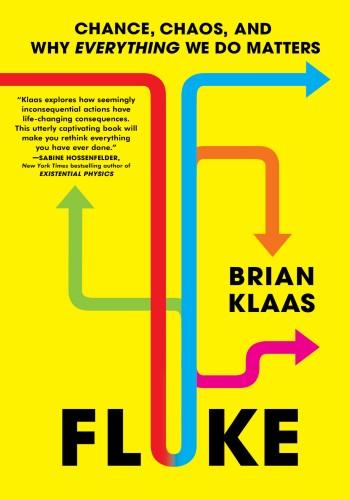
Fluke: Chance, Chaos, and Why Everything We Do Matters
by
Brian Klaas
Published 23 Jan 2024
Today, modern Christianity tends to prioritize the role of a unique self, both in individual moral responsibility and in prayers asking for divine intervention from a singular God who acts and is depicted as an individual. In some strains of modern Protestantism, particularly in the United States, “prosperity theology” has even taken root, in which an individual’s faith, donations to religious causes, and positive thinking will directly be rewarded by God. Wealth is on a divine menu, but it’s up to you, and you alone, to order it. For many post-Enlightenment Christians, the scripts of our lives are written above us by a sole supernatural author, rather than all around us through a more diffuse divine presence.
…
See also evolution nature, oneness with, 31, 33 nature–nurture dichotomy, 45 Nazism, 1, 162, 177 “negative capability,” 262 neural networks, 28, 159, 226, 231 neuroscience, 12, 67, 74, 133, 242 schemas and, 170 storytelling and, 137 Newton, Isaac, 16, 23, 33, 107, 254 laws of, 16, 22, 227 Principia (1687), 227 Nietzsche, Friedrich, 253 Obama, Barack, 120, 121 On the Banks of Plum Creek (Wilder), 82 On the Origin of Species (Darwin), 39, 176 Orent, Arika, 191 Orgel’s second rule, 257 Ortelius, Abraham, 173n Orthodox Judaism, 129 outliers, 104, 214 overview effect, astronauts and, 29 Page, Scott, 97 Pagel, Mark, 51 Paltrow, Gwyneth, 47, 223 pandemics, 12, 28, 87, 97, 101, 190 paradigm shift, 173 parasites, 35, 41 Pareto distribution, 43 Parfit, Derek, 36, 37, 159n Pascal, Blaise, 107 past-present-future relationship: assumption of past as guide for the future, 106–7 chain-link past, 8 determinism and, 222 Laplace’s demon and, 23–24 present moment tied to threads from the past, 21 time travel and, 6 path dependency, 90–91, 148–49 pattern detection, 70–71, 77 PAX6 gene, 15 peer review, 198, 201, 202 philosophy, 11, 32–33, 227 phrenology, 177 physics, 11, 12, 22–23, 30, 88, 237 comparison with social science, 211 determinism and, 222, 223 discarded theories in, 112 free will and, 232 Newtonian, 22, 23, 227 quantum physics, 72, 109–10, 228 roll of dice and, 42n Pillsbury, John S., 82n Pine Tree Riot (New Hampshire, 1772), 144–45 Pinker, Steven, 67 Pitt, Brad, 259 Pittman, Colonel Samuel, 168 Planck, Max, 109 Poincaré, Henri, 263 Poisson distribution, 73 political parties, 92 political science, 11, 88, 148, 196 Popova, Maria, 247 Popper, Karl, 172 pratītyasamutpāda (“dependent origination”), 226 precognition, 201 presidential election (2016), 116, 167, 208–9 presidential election (2020), 156, 157 primates, life in trees and, 145–46 Princip, Gavrilo, 99 Principia (Newton, 1687), 227 probabilities, 37, 106, 114, 165, 228 belief-type, 117 frequency-type, 117 Hume’s definition of, 108 stationary and nonstationary, 120, 125 theory of, 107 weather forecasting and, 115–16 “prosperity theology,” 34 Protestantism, 33–34 Protestant Reformation, 92 “Protestant work ethic,” 34, 153 psychology, 12, 199, 242 publication bias, 202 punditry, 75 Putin, Vladimir, 101 P values, hacking of, 199–201, 203 quantum mechanics, 111, 211, 220, 237 Bohmian mechanics, 229 Copenhagen interpretation, 228 Quetelet, Adolphe, 108 racism, 150, 151, 242 Radical Uncertainty (Kay and King), 118 Randall, Lisa, 14 randomness, 5, 13, 45, 70, 88 exploration of the unknown and, 261 of genetic mutations and variations, 48–49 ignored in evolutionary change, 57 misfortune and, 44 neutral molecular theory and, 61 quantum mechanics and, 228 storytelling and, 137 unsatisfying to narratives, 73 Randomness in Evolution (Bonner), 58n Rarámuri people, 33 rational-choice theory, 16, 131–33, 165 reality: complexity of, 30 as interconnectedness, 27 limitations of sense perception and, 67–69 “manifest image” of, 66 narrative arc missing from, 140 relational nature of, 37 storybook version of, 7, 13, 131, 160–61, 196, 199, 247 red heifer, messianism and, 129–31 reductionism, 35 regularity, 20, 86–87, 91, 103 relational view, 32, 33, 37 religion, 11, 74, 134 basins of attraction and, 92 unity with natural world and, 33 replication crisis, 198–99, 200 retroviruses, 40 Rift Valley (East Africa), 146–47 ripple effects, 159, 177, 244, 255, 264 risk, 106, 113, 196 Ritchie, Stuart, 198 Roman and Greek numerals, 107 Romer, Paul, 213 Rosa, Hartmut, 249 rounding errors, 25 Rovelli, Carlo, 185 Royal Navy, British, 144 Ruelle, David, 165 Rumsfeld, Donald, 123 Russell, Jack, 192 Sally, David, 210 sandpiles, 97, 98, 101 Saudi Arabia, discovery of oil reserves in, 149–50 schemas, 169, 170 Schrödinger’s equation, 111, 228 science, 34, 108, 109 philosophy of science, 172–73 scientific revolution, 22 strong-link problems and, 209–11 sea turtles, light used as shortcut by, 78 second order desires, 236–37 Secret, The (Byrne), 250, 251 self-help books, 19–20, 31, 249, 251, 255 self-organized criticality, 96, 97 September 11, 2001, terrorist attacks, 54, 134, 135, 182–83, 184, 190, 208 Shaw, George Bernard, 10 Sheen, Martin, 235 Sheldrake, Merlin, 35 Shiller, Robert, 138, 139 shocks, 97, 104 Shortcut Creature, 65, 67, 68, 70, 78, 79 signaling, 169–70 signal-noise relationship, 27, 46, 204, 214 Silver, Nate, 105, 116, 120, 208–9 Simmel, Marianne, 71 Simpson, George Gaylord, 173, 174 simulations, 25, 43 Sliding Doors (film, 1998), 47, 57, 223 Smith, Adam, 16, 131, 164 soccer ball, tourist off Greek coast saved by, 20–21, 28, 57 social science, 11, 75, 112–13, 150, 195 easy and hard problems of social research, 197, 203, 205, 217 file drawer problem, 201, 202 Fragile Families Challenge, 216–17 Holy Grail of Causality, 216 misuse of mathematics in, 213–14 P-hacking and, 199–201, 203 replication crisis, 198–99, 200 sociology, 49, 88, 108, 196, 199 space-time, 143 spiritualism, 171 split-brain experiments, 74 stability, 13, 88, 95, 254 causes of World War I and, 98 comforting routine and, 13 dictatorships and, 206 global instability, 87 global stability, 85 illusion of, 92, 103 local instability, 85 local stability, 86 of political systems, 9 statistics, 108, 119 Stimson, Henry L., 1–3, 10, 17, 27, 127, 250, 255 stock market, 91, 103 Stokes, Pringle, 174–75, 178 Stone Age, 85, 86 Story Paradox, The (Gottschall), 140 strong-link problems, 210–11 structuration, 243 Structure of Scientific Revolutions, The (Kuhn, 1962), 172–73 supernatural powers, 22 superstition, 72–73, 75, 113, 258, 259 supply-and-demand curve, 89 supply-chain disruptions, 28 survivorship bias, 60 swarms, 82–84, 87, 96, 97, 102 synaptic pruning, 67 Szymborska, Wislawa, 254 Tackett, Jennifer, 200n Taleb, Nassim Nicholas, 28, 43, 93, 124 tectonic plates, movements of, 143, 146, 147, 155, 173–74 teleological bias, 75–76 Temple Mount (Jerusalem), 129–30 terrorism, 97 theology, 227 Thompson, D’Arcy, 42 Thompson, E.
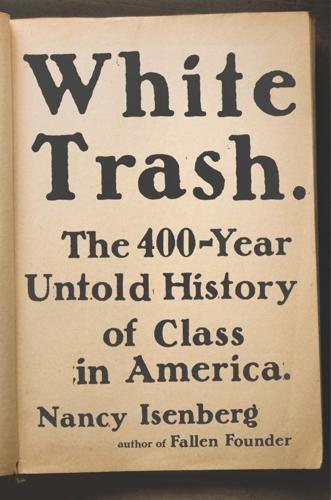
White Trash: The 400-Year Untold History of Class in America
by
Nancy Isenberg
Published 20 Jun 2016
In admitting his overindulgences, Bakker crooned, “I’m excessive. Dear Lord, I’m excessive. . . . God is a great God. He deserves my best.” The second-rate hustler was a real-life version of Andy Griffith’s role as Lonesome Rhodes in A Face in the Crowd. Or as one reporter claimed after watching untold hours of the Bakkers’ show, their prosperity theology and living-room preaching had “the cheesy feel of Petticoat Junction.”38 Greed was just the backstory. Tammy Faye, who became known for the makeup that oozed down her cheeks as she wept along with her flock, had to be carted off to rehab for an addiction to tranquilizers. Meanwhile, her reverend husband was paying hush money to the church secretary, a young woman he had used sexually seven years earlier.
…
She also became for true believers a real-life Christian Cinderella story; one PTL partner made a handcrafted doll of her (marketed for adults, not children) that sold for $675. The Tammy Barbie was a fairy-tale princess with a large heart, adorned, as well, with exaggerated eyelashes.43 The seductive and materialistic message of prosperity theology. Tammy Faye Bakker on the cover of her album Don’t Give Up. Tammy Faye Bakker, Don’t Give Up (1985) Yet this fairy tale did not have a happy ending. The media storm made the couple appear completely pathetic; Tammy gained little sympathy as a naïve wife. (Her kookiness probably saved her from indictment.)
…
On living in a trailer and later excesses, see Shepard, Forgiven, 35, 110, 133, 180, 201, 249, 264, 551. 38. On Jim Bakker’s use of his poor class background in his religious message, see Richard N. Ostling, “TV’s Unholy Row: A Sex-and-Money Scandal Tarnishes Electronic Evangelicalism,” Time (April 6, 1987): 60–64, 67, esp. 62. On prosperity theology, see “Jim Bakker,” in Randall Herbert Balmer, Encyclopedia of Evangelicalism (Waco, TX: Baylor University Press, 2004), 50–52; and Axel R. Schafer, Countercultural Conservatives: American Evangelicalism from the Postwar Revival to the New Christian Right (Madison: University of Wisconsin Press, 2011), 125.

Too Much and Never Enough: How My Family Created the World's Most Dangerous Man
by
Mary L. Trump
Published 13 Jul 2020
He worked hard, but unlike most people who work hard, he was rewarded with government grants, the almost limitless help of highly connected cronies, and immensely good fortune. Fred didn’t need to read The Power of Positive Thinking in order to co-opt, for his own purposes, the most superficial and self-serving aspects of Peale’s message. Anticipating the prosperity gospel, Peale’s doctrine proclaimed that you need only self-confidence in order to prosper in the way God wants you to. “[O]bstacles are simply not permitted to destroy your happiness and well-being. You need be defeated only if you are willing to be,” Peale wrote. That view neatly confirmed what Fred already thought: he was rich because he deserved to be.
…
… A sense of inferiority and inadequacy interferes with the attainment of your hopes, but self-confidence leads to self-realization and successful achievement.” Self-doubt wasn’t part of Fred’s makeup, and he never considered the possibility of his own defeat. As Peale also wrote, “It is appalling to realize the number of pathetic people who are hampered and made miserable by the malady popularly called the inferiority complex.” Peale’s proto–prosperity gospel actually complemented the scarcity mentality Fred continued to cling to. For him, it was not “the more you have, the more you can give.” It was “the more you have, the more you have.” Financial worth was the same as self-worth, monetary value was human value. The more Fred Trump had, the better he was.
…
Despite treatment programs such as Alcoholics Anonymous, which had been around since 1935, the stigma attached to addicts and addiction persisted. “Just make up your mind, Fred,” my grandfather said, offering a useless platitude that Norman Vincent Peale would have approved of. The closest thing Fred had to a philosophy was the prosperity gospel, which he used like a blunt instrument and an escape hatch, and it had never harmed any of his children more than it did right then. “That’s like telling me to make up my mind to give up cancer,” Dad said. He was right, but my grandfather wholeheartedly embraced the “blame the victim” mentality that was still pervasive and couldn’t make that leap.

The Death of Truth: Notes on Falsehood in the Age of Trump
by
Michiko Kakutani
Published 17 Jul 2018
Predating Esalen and EST and the encounter groups that attracted hippies and New Age seekers intent on expanding their consciousness in the 1960s and 1970s were two influential figures whose doctrines of self-realization were more materialistic and more attractive to politicians and suburban Rotarians. Norman Vincent Peale, the author of the 1952 self-help bestseller The Power of Positive Thinking—known as “God’s salesman” for his hawking of the prosperity gospel—was admired by Trump’s father, Fred, and the younger Trump would internalize the celebrity pastor’s teachings on self-fulfillment and the power of the mind to create its own reality. “Any fact facing us, however difficult, even seemingly hopeless, is not so important as our attitude toward that fact,” Peale wrote, seeming to promote the doctrine of denial along with the doctrine of success.
…
“small private societies”: Alexis de Tocqueville, Democracy in America (New York: Vintage, 1990), 215, 319, 318, 321. Norman Vincent Peale: James Barron, “Overlooked Influences on Donald Trump: A Famous Minister and His Church,” New York Times, Sept. 5, 2016; Tom Gjelten, “How Positive Thinking, Prosperity Gospel Define Donald Trump’s Faith Outlook,” NPR, Aug. 3, 2016. “Any fact facing us”: Tamara Keith, “Trump Crowd Size Estimate May Involve ‘the Power of Positive Thinking,’ ” NPR, Jan. 22, 2017. Ayn Rand, also admired: Mackenzie Weinger, “7 Pols Who Praised Ayn Rand,” Politico, Apr. 26, 2012.
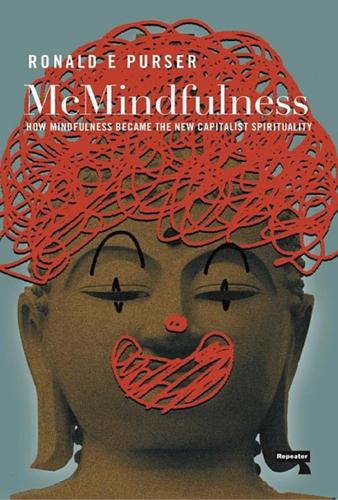
McMindfulness: How Mindfulness Became the New Capitalist Spirituality
by
Ronald Purser
Published 8 Jul 2019
“There is a swath in our culture who is not going to listen to someone in monks’ robes, but they are paying attention to scientific evidence,” says Richard Davidson, a pioneer in the emerging field of contemplative neuroscience.5 A similar idea is less respectfully expressed on the inside cover of the New York Times bestseller Search Inside Yourself: The Unexpected Path to Achieving Success, Happiness (and World Peace), which states that mindfulness “cannot be the domain of bald people in funny robes.”6 The author, Google’s former in-house guru Chade-Meng Tan, cites study after study to back up his claims that mindfulness delivers greater happiness, health, career success and wealth, and “everything can be completely secular.” His version of mindfulness is a way to have it all with the playful spirit. This sort of prosperity-gospel thinking is often combined with a naïve faith in the authority of science as the sole arbiter of truth, meaning and value. Early promoters of Buddhist ideas used scientific metaphors to make them sound modern. For example The Gospel of Buddha, an 1894 book by Paul Carus, hailed the Buddha as “the first prophet of the Religion of Science”7 — modern mindfulness echoes this rhetoric.
…
Another Davos acolyte, the MIT management theorist Otto Scharmer, runs an organization called The Presencing Institute, providing cover for elites: “The root cause of our current economic and civilizational crisis is not Wall Street,” he says, “not infinite growth [and] not Big Business or Big Government.”5 No, the root cause, according to Scharmer is “between our ears.” He was one of the courtiers at the 2014 WEF, chatting about how to be mindful like Nelson Mandela.6 Following the lead of Marturano, there has been a steady procession of mindfulness teachers, Buddhist monks, neuroscientists, and celebrities spreading the postmodern prosperity gospel. At the 2014 annual meeting, the actress Goldie Hawn promoted her MindUP™ program for children, leading a session on how mindfulness training and social-emotional learning can change the world. While she spoke, the main hall was in thrall to President Hassan Rouhani of Iran, leader of one of the most repressive regimes in the world.
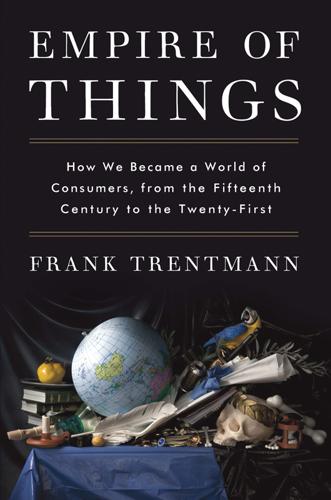
Empire of Things: How We Became a World of Consumers, From the Fifteenth Century to the Twenty-First
by
Frank Trentmann
Published 1 Dec 2015
The idea that stylish objects radiated a spark of divine beauty also had its champions in Europe, as we have seen in earlier chapters.14 What made American churches distinctive was that they turned the moral defence of prosperity into a business model, tapping into their members’ success to finance their own expansion. The preachers of the ‘prosperity gospel’ in the 1960s and televangelism and mega-churches since need to be seen in this longer historical context, although they lost the progressive mission of the earlier ‘social gospel’ ministers. God offered believers a material– spiritual new deal: give yourself over to Him and, in exchange, He will increase your wealth.
…
ABC (Always Be Cheerful) Groups 505 aborigines 450 Abrams, Mark 343 absenteeism 471, 529, 530, 531 abundance, society of 55–7, 153–4, 157–8, 230–31, 284, 303, 326, 357–8 see also affluence; America’s transformation from scarcity to 287; Nazi promise of abundance and affluence 290, 291; and tolerance of individual choice 303 acquisition 4, 31, 34 see also possessions; through tribute see tribute Adams, John 111 Addams, Jane 216–17 Addison, Joseph 89 Adeboye, Enoch 614, 615 Adelaide 670, 671 Adenauer, Konrad 526 Adorno, Theodor 95, 266–7, 268 Adventures of Sei-chan 489 advertising 2, 9, 69, 171–3, 180, 198, 317–20, 378, 471, 522, 677, 680; advertisers’ view of shoppers 288; agencies 319, 494; American 318, 318, 319, 485; anti-advertising 315; ‘anti-pub’ campaign in Brussels 648; cocoa 167, 171–2; and the convergence of consumption and citizenship 287; and the creation of wants 302, 677; educational value of 489; expenditure per capita (1980) 320; fair-trade 567; flyer ban in Italian cities 648; and nationalism 172–3; pitching democratic consumers against dictatorial politicians 287–8; post-war expenditure 317–18; and psychological techniques 315–16, 317, 318; and the restless self 231; restrictions in Sweden 489; small shops as leaders in 205; socialist 327; and students 312, 494–5; targeting children/youth 314–15, 485, 487, 489–90, 494–5; television 319–20, 489–90; trade cards 192 affluence 338–54 see also abundance, society of; affluent society; wealth; acceptance of 307–8, 325–6; affluent budgets 338–9; affluent society see affluent society; ‘affluenza’ 405, 406; age of (1949–73) 12, 272, 317, 338, 344, 348, 411, 435, 510, 539–40, 638, 659; and Americanization thesis 348–54; Asian lack of problem with 385; breeding ‘private opulence and public squalor’ 8, 302; and cheap entertainment 455; and choice 12, 303, 403, 548–61 see also choice; civil rights activism 324–5; and class/status 303, 316, 339–48; during the Cold War 300–326; and complaining 558–9; and Conservatives 307–8; as a dangerous spiral 306; European views of affluence as an American invasion 305–6; and evangelical prosperity gospel 610–11, 615; and happiness 452, 455; and identity 344; ideological battleground of 274–337; and ‘increasing scarcity of time’ 460; and individuality 548; infatuation with 115; and the inter-war years 273–300; and leisure 443, 452, 455, 456, 460–63, 468–70, 483; and loneliness 500; and markets 12 see also markets; narrative of 12; Nazi promise of abundance and 290, 291; and needs 272–3, 320–21, 508–9; negative effects of 153; private affluence helped by public consumption 373; and public spending 304–5, 326, 373; and the slowing down of competitive status-seeking 303, 316; and social transformation 548; and the socialist consumer culture 326–37; in South Korea 384–5; and sustainability see sustainability; and time poverty 460; and trade unionists 306, 343; and waste shift from producer to consumer 649; in Western Europe after Second World War 273 affluent society 6, 9, 302, 403, 538, 678; and allocation of time 452; critics/critiques 314, 403; and diets 587–8, 604–5; and the elderly 498–517; Galbraith’s The Affluent Society 7–8, 273, 302–3, 304, 305, 359, 678; and happiness 452, 455; as ‘joyless’ 455; polarization of work and leisure 443, 468–73; public services and choice in 548–61; and religion 606–21; and social spending 304–5, 326 see also social spending; spread of 11; and ‘throwaway society’ 622–75; transition from industrial to knowledge-based 470 Africa 11, 122–36, 174, 347; adoption of European clothes 4, 129, 130, 132, 136; depopulation with labour needs for cultivating America 79; dispossession and repossession 122–36; East 23, 64, 80, 124, 125, 129, 132, 134, 135, 136, 596; end of domestic slavery in 122; exodus of Indians and Pakistanis from East Africa to Britain with decolonization 596; Gold Coast 124; interplay between spiritual and material rebirth 614; the ‘lazy African’ 133, 471; leisure 471–2; middlemen 129, 131, 133, 134; Migration Project 589, 592, 593–5, 594; missionaries in 125–6, 133–5, 614–15; Pentecostalist revival 613–14; pre-colonial 123, 124, 125, 135; and remittances 590, 592, 594; scramble for 121, 129–30, 133; scrapped cars sent to 653; and the slave trade see slavery/slaves; South see South Africa; and ‘spirit of poverty’ doctrine 614; sub-Saharan 124, 252, 656; trade 129–31, 133; wages 173; West 27, 122, 124, 125, 129, 130–31; westernization of Africans 126–7, 252 African-Americans 215, 238–9, 247, 324–5, 505 age see generations agnostics 612 air-conditioning 15, 244, 323, 341, 348, 379, 611, 689 airbnb 655 Al-Khanssaa Brigade 617 Aladdin Company 239–40 Alberti, Leon Battista 34 alcohol 65, 141, 142, 149, 153, 161, 166; beer see beer; cocktails 462; in Japan 359; outlawed in Iran 616; poisonous methyl alcohol 387; problematic rise in drink 305; spirits 65, 140, 142, 166, 171 see also brandy; gin; wine see wine Alcoholics Anonymous 555 Alexandria 202–3 Alexandria Water Co. 178 Algarve 513 alienation 230 Allasio, Marisa 301 Alpino, Prospero 84–5 Altamira, Mexico 591 Altenloh, Emilie 215 aluminium 225, 250, 251, 639, 652, 683–4; cans 625, 647; pollution and greenhouse gas emission from 683–4 American Association of Retired Persons 501, 513, 515 American Can Company 524 American Civil Liberties Union 555–6 American Civil War 122, 638 American Express 500 American Journal of Nursing 505 American Tract Society 608 Americanization 273, 282–3, 324, 348–54, 377–9, 527 Americas 25–6; American Civil War 122, 638; American Revolution 111; Central America 80, 334; depopulation 79; English settlers 27; and European land cultivation 79; Latin America see Latin America; New World see New World; and the slave trade see slavery/slaves; trade 23; USA see United States of America Amores, Maria de 64 Amsterdam 38, 55–7, 72, 86, 90–91, 630 amusement parks 219, 220 animism 385–6 Anka, Paul 351 anonymity 94 anthropologists 6 anti-colonialism 16, 274; and clothes 296–8, 299, 347; India and Gandhi 296–8, 379–80 antiquity, value of 4, 50, 53, 227 Antwerp 32, 38, 88, 156, 192 apartheid 577 aphrodisiacs 85 Aragon, Louis 306 Archigram 636 Argentina 161, 170, 265 aristocrats/gentry 49, 52, 59, 60, 69, 84, 100, 137, 142; ‘atavistic’ aristocracy 119; excesses of nobility 100, 103; gentlewomen 87; Renaissance 30, 33, 35 Aristotle 98, 455; golden mean 390 Armstrong, Louis 352 arson 300, 321–2 art 30, 52, 463; conceptual 636; creative arts 465, 496 see also music; Dada 636; dematerialized 636; Japanese arts and self-cultivation 472; paintings see paintings/pictures; ‘readymade’ 636–7; and waste 636–7 Arthashastra 357 artisans 41, 42, 44, 47, 74, 103, 139, 215; Renaissance 29, 31, 32, 38 artists 38, 96, 263, 284, 315, 441, 547, 627; Brazilian 352; conceptual 636; modernist 199, 319; musical 263, 351, 352; threatened by standardization 225; window artists 194 arts and crafts movement 225 Asaf ud-Daula 138 Asahi 378 Ashanti kingdom (Ghana) 131–2 Asia see also specific countries: Americanization 377–9; Asian migrants to London 596–7; banking network in South Asia 367; citizenship 357; company services 531, 534; consumer movements 392–3, 394–8, 552; crisis of 1989 371, 372; dematerialization 669; football 617; luxury brands 439; middle class in 140, 142, 143, 355–6, 373–5, 380, 392, 519; migration within 356, 595; modernity 358, 368, 378, 379–82; old age in 517–19; rise of consumption and modern consumer societies 355–99; television 355, 363, 364, 365, 366, 367, 368, 374, 375, 378, 379; the traditional but modern consumer 362, 373–87 Asianization 379 aspiration 42, 98, 175, 228, 325, 362 see also desire for things; aspiring bourgeoisie 227; aspiring middle classes 79, 142, 224, 341; Chinese, under Mao 368; fed by the cinema 282–3, 301–2; socialist 327, 333; spiral of aspirational spending 74; and working class solidarity 340, 343–4 Assam tea 79, 169 Association of Bank Users (ADICAE) 558 A.
…
Stewart (department store) 192 AT&T 287 Atatürk, Mustafa Kemal 619 Atlanta, water consumption 177, 187, 188 Atlantic empire 92 Atlantic trade see transatlantic consumption and trade auctions 69, 71, 145, 656 audience research 319 audiotapes 619 Augustine of Hippo 8 Augustus the Strong 88 Austen, Jane 196 austerity 12, 106, 273, 289, 338–9, 390, 539, 610, 612, 675 see also thrift; instant gratification in the midst of 607; and socialism 331, 337 Australia 429, 481, 543, 669, 670; aborigines 450; mortgages 423, 522; outsourcing environmental burden to 669; Productivity Commission 481 Austria 363, 409, 441, 478, 513, 542, 548, 644, 668 authenticity 132, 158–9, 223, 227, 235; the authentic self 96, 100, 235; consumption and inauthenticity 135, 138; in local food 580, 581, 583; post-material search for authentic experiences 384, 685–6; religious 601 authoritarianism 374, 386, 394, 397, 535 see also totalitarianism; antiauthoritarian politics and consumer culture 322; ‘social authoritarianism’ of the radio 266 automobiles see cars avarice 8, 156, 285, 386, 405, 449 Aznavour, Charles 352 Aztecs 78–9, 84 Baader, Andreas 322 baboos 143 Bacon, Francis 84–5 Bainbridge drapers, Newcastle 192 Bakker, Jim 611 Bandello, Matteo 30 Bangladesh 367 bankruptcy 418, 431–3 banks 239, 426; bancarisation of the people 423; Bank of Japan 363; Banque de France 533; children’s 363, 417; Dutch National Bank 563; Federal Reserve bankers 414; German 416; Indian 367; inequality and location of bank branches 432; lawsuit by ADICAE against Spanish banks 558; and private credit 414, 415, 416; savings banks 243, 362, 417, 418, 419; sponsoring of company services 536; World Bank see World Bank Barbedienne, Ferdinand, foundry 225–6 Barbon, Nicholas 98, 100 Barlaeus, Caspar 96 Baroda 380 barter 46, 117, 130, 277, 328, 335 see also haggling Bastiat, Frédéric 117, 151 Bat’a, Tomáš 525 bathing 189–90 bathrooms 178, 179, 189, 221, 238, 242, 248, 307 baths 176, 184, 186, 189, 244, 247; swimming baths 190 Baudrillard, Jean 324 Bauer, Edgar 115 Bauer, Samuel 88 Bauer, Yevgeni 199 Bauman, Zygmunt 520 Bayle, Pierre 102 Bayly, Christopher 138 bazaars 192, 209 BBC (British Broadcasting Corporation) 266 beads 25, 77, 104, 124–5, 574 Beatles 352 Becker, Gary 74, 427 bedding 31, 55, 56, 60, 62, 63, 678 bedroom furniture 30, 31 Beecher, Catherine 247 Beecher, Henry Ward 610 beer 10, 27, 58, 80, 88, 166, 252, 318, 331, 358, 359, 371, 475, 508, 509, 535, 546, 559; 1830 Beer Act, England 476; bottles 636, 647, 661; German 358, 559 Beijing 44, 46, 47, 72, 72, 93, 190–91, 357, 395, 493, 494; Tianqiao market 190, 191, 685 Belgium 120, 148, 534, 547; elderly people 508; fair trade 570; homes 243, 245; household savings rate 420, 421; recycling 644; Sunday restrictions 478 Belize (British Honduras) 170–71, 581–2, 626 Bellamy, Edward 269–70 Belmondo, Jean-Paul 322 Benjamin, Walter 191, 197–8 Bentham, Jeremy 152 Bentley, Thomas 69 Benzoni, Girolamo 78 Berg, Alban 267 beriberi 543 Berlin 155, 156, 168, 179, 187, 189, 207, 295, 307, 328, 477, 479, 549–50, 627, 635–6; elderly people 507–8; Gloria-Palast 211; Horseshoe Estate 222, 223; Kommune 1 (first political commune) 322, 323; Mann family home 251; Tietz 193; Wall 301, 333, 646; water consumption 186, 187; Wertheim 199–200 Bern 156, 470 betel nut 47, 150, 168 Bethmann-Hollweg, Martha von 156 Better Homes and Gardens 377 Betts, Tristram 574 Beverwijk, Anna Nannige 55 Bianciardi, Luciano 350 Bibelot, Le 227 Biermann, Wolf 334–5 Biles, Judith 511 Billington-Greig, Teresa 157 Binèt, René 192 biodiversity decline 604 bird fights 137 biribissi 30 Birmingham 141, 243, 559 Black Death 58 black market 65, 330 see also smuggling Blackpool 210, 220 Blackstone, William 103–4 Blair, Tony 5, 548 Blair government 549 ‘Blondie’ comic strip 378 body: the ageing body 514–15 see also elderly people; bodily humours 84, 85; clothes as an extension of the body 296; hygiene see hygiene; man’s two general wants of body and mind (Barbon) 98; mind–body/matter duality 95, 230–31; smearing 126; union/balance between mind and 101, 246, 397 Boeing 529–30, 532 Bolsheviks 276–7 Bon Marché 191, 192, 193, 194, 199, 204 books 30, 31, 32, 44, 45, 47, 51, 53, 55, 56, 616, 658 see also libraries boot sales 654 Bootle 506 Bormann, Heinz 328 Boston 86, 177, 179, 187; tea party 111 bottle banks 639 Boucicant, Aristide 204 Boulton, Matthew 53 Bourdieu, Pierre 344–6 bourgeoisie 86, 87, 94, 117, 118, 165, 181, 215, 227, 292–3, 311, 345, 374; aspiration 227; Bildungsbürgertum 416; the bourgeois home 250, 251, 345; childhood seen as invention of bourgeois modernity 486; culture of restraint 117, 118, 311; ‘embourgeoisement’ thesis of British working class 342–4; in Paris 225–6, 250, 374; and Soviet material culture 292–5 Bournville 171, 172, 528 Bovril adverts 171 Bow, Clara 281 bowls (game) 506, 529 boycotts 2, 111, 128, 296, 385, 393, 561, 571, 681; anti-slavery 128, 156, 184, 559, 571–2; and apartheid 577; of British goods 268, 297, 299; Chinese consumer boycotts 298–9; consumer jihads 618–19; in Egypt 299; and ethical consumerism 576–7; of gas companies 183; and national products 297–300; of sweat shops/sweated goods 155, 156 Boyle, Robert 97 Bradenton Kiwanis Club 498–9 Bradford 601; Kirkgate Market 207 Brahmins 142, 144, 381 Bramwell, Sir Frederick 185, 188 branding 2, 68–9, 173, 439 see also advertising; labelling; rebranding; American in-school branded give-aways 485; children’s recognition of brands 485; fair-trade 565–6, 570; trademarks 47, 486 brandy 86, 106, 107, 143, 161, 166, 170 Brassens, Georges 180, 351, 352 Braudel, Fernand 9, 22 Bravo 312 Brazil 11, 122, 161, 163, 165, 166, 352, 372, 515, 566, 569; Fordlandia 527, 528; middle class 373; Pentecostalism 613–14; waste management 651 Brazzaville (Congo) 347, 471–2 Bread for the World 577 Brezhnev, Leonid Ilyich 11, 330, 545 bridewealth 370 Brignole family, Genoa 29 Brilliant Earth 567 Britain and the United Kingdom see also England; Scotland; Wales: abolition of, and battle against slavery 121, 122, 123–4, 125, 572; affluence and social transformation 548; artisans 74; bankruptcy 433; and the ‘birth’ of the consumer society 10, 22, 73; British textiles bought in India 139–40; charity shops 654; chocolate drinks 165; church attendance 306, 475, 479, 607; cinemas 212; ‘Citizen Charter’ of Major Government 389; clothes shopping by British women 674; clothing items in 2013 1; coffee consumption 91, 566; Conservatives 308, 549, 554–5, 556, 640; consumer co-operatives 206; consumer complaints 558, 559; and consumer freedom 419–20; Consumers’ Association 551; cotton industry 66, 77, 170; council housing 243, 553–5; credit 409, 410, 412, 414, 415, 416, 423, 424, 426, 429, 430, 431; defence spending 542; demand for British goods 126, 140, 170–71; dematerialization 668; domestic energy consumption 672, 674; domestic interior at centre stage 108; elderly people 506, 507, 509–11, 512; ‘embourgeoisement’ thesis of British working class 342–4; fair trade 562, 564, 565, 566, 577–8; food banks 338–9; foreign boycotts of British goods 268, 297, 299; free time activities of men and women aged 20 to 74 (1998–2002) 458–9; and free trade 91, 120–21, 136, 140, 141, 163–4, 572; GDP 12, 423, 668; health support groups 555; as high-wage economy 99; home-equity loans 429; home ownership 236, 245; home size 675; household cultural spending 548; household debt 409, 425, 426–7; household goods spending 554; household waste 1980–2005 643; household wealth 426; imports from West Indies 161; income share of the rich 436, 437; increase in possessions during 17th and 18th centuries 23; Insolvency Act (1986) 431; Keep Britain Tidy Group 639; Labour Party see Labour Party, UK; leading place in post-war consumer culture 475; leisure hours 451; liberalism and home decoration 226; luxury debate 99–100; marketing boards 319; material flow 668–9; middle class and the state 548; middling sort 65, 73; mobile phones 464; mortgages 242, 420; municipal waste 622; National Consumer Council 551, 560; New Labour 548, 549; NHS see National Health Service; Ombudsmen 557; online shopping 482; outsourcing environmental burden 669; over-indebtedness 431; people outside world of finance 432; and politeness 109; post office savings 418; public services and choice 561; rag trade 628–9; reading habits 354, 461; recycling 639, 640, 645; sabbatarianism 476; salvage 637–8; savings 418–19, 420, 421, 430; servants 58–9; silk export 67; social spending 537, 539; socializing 461; solo living 654; state help for industry 65–6, 77; sugar consumption 91, 165–6; supermarkets 349; and tea 60, 61, 65, 75, 79, 81, 90, 91–2, 162, 165; teenage market 495; Tenant’s Charter 555; Thatcher government 640; Total Material Requirement 668; trust in food system 584; as unequal society 73; urban density 93; Victorian Britain see Victorians; wages 71–2, 75, 99, 115, 146–7, 281; waste generation lowering 640; waste incinerators 632; water meters 188; Women’s Co-operative Guild 157; working class spending power 281; working hours 449; youth spending power 281, 485 British empire 11, 91, 162, 307; and American trade 164–5; and anti-colonialism 296–8, 299, 379–80; ‘Buy Empire Goods’ campaign 300, 572–3; by-laws 141; and coffee 79, 91; colonial tea plantations 79; Egypt under British occupation 300; Empire shopping weeks 300, 572; flow of goods and slaves (1770) 82–3; Imperial Postal Order Service 590; India and the Raj 137–46, 296–8; Indian legacy 379; industrial superiority 120; and investment 160; as liberal free-trade empire 120–21, 140, 141, 163–4; naval power 120; and remittances 590; taxation 121, 139, 141, 161–2; unease with the African consumer 136; Western goods and colonial identity 131, 132 British Honduras (Belize) 170–71, 581–2, 626 British Museum 477 Broadway 212 Brook, Timothy 96 Brown, Gordon 428 Brussels 192, 648 Buarque, Chico 352 Budapest 193, 275, 630 Buddha 612 Buddhism 385, 390, 472, 607, 613, 615–16 budget studies 147–50, 283 Buenos Aires 80, 181, 193 Bulgaria 327, 672 Burckhardt, Jacob: The Civilization of the Renaissance in Italy 30 Burgundy 69 burials 51 see also funerals Burkina Faso 591, 592 Butler, Richard 133 Buxton, Thomas Fowell 127 buyers’ leagues see consumers’/buyers’ leagues BVB Dortmund 563 C&A 479 Cabanagem Rebellion 163 Cadbury 128, 167, 171–2, 528, 563, 568 caffeine 80, 88, 166 see also coffee Cairo 23, 80, 174, 202; Au Petit Louvre 204; bourgeois homes 251; Fire (1952) 300, 322; University 299 Calabria 302, 586, 598 Calcutta 137, 143, 144–5, 602 calico 65, 77, 124 Calvelli-Adorno, Maria 267 Calvinists 57, 58, 614 Cameroon, French 132–3 Campbell, Colin 290 Canada 247, 253, 420, 425, 431, 540, 572–3, 681; Sunday trading and deregulation 476, 478 candy stores 217, 219 canning industry 638–9 cantautore 352 Canton 89 capitalism 3, 4, 22, 27–8, 95, 157, 160, 174, 444, 649; and animism 385–6; Chinese state capitalism 680; consumerism and democracy as one package with 273; consumption as capitalist subliminal weapon of domination 321; credit and consumer capitalism 409; department stores as children of 191; finance capitalism 119; inter-war crisis of 279; Marxist critique 112–13, 385; private versus state 288; welfare capitalism 523, 525, 529 Cappello, Domenico 29 Capron, Illinois 661 Caracas 80 carbon emissions 2, 15, 538, 647, 666, 667, 675; embedded carbon and ecological footprint 15, 675, 686, 687, 689 Caribbean 79, 123 Carlos, Roberto 352 Carlyle, Thomas 455 carpets 55, 57, 117, 138, 145, 146, 194, 205, 224, 225, 226, 330; Turkish 23, 30, 96 Carrefour 349, 371 cars 14, 217, 247, 248, 302–3, 315, 322, 324–5, 326, 426, 442; American sales 279, 281, 428; boot sales 654; car-sharing 654, 656, 687–8; with catalytic converters 653; in China 355; democratization of the car 301; dependence on the car 340; in East Germany 330, 331, 332, 335, 336; and emotions 686; free time spent in 460; in India 366, 382; and Italian culture 324; life expectancy 658; motoring cult in America 544; and platinum 653; repairing 659; second-hand market 658; Trabant 331, 335, 337 Carson, Rachel 639 cartels 278 Carter, Jimmy 325 Caruso, Enrico 263 Cary, John 99 caste 143–4, 298, 315, 381–2 Casteldurante 30 Castellani, Francesco di Matteo 34 Castellani, Lena 34 Catalonia 75–6 Cavill, Frederick 167 celebrity culture 435 Celentano, Adriano 311 cement making 667 censorship 312 Central America 80, 334 central heating 15, 244, 244, 302, 339, 673, 687 ceramics see pottery/ceramics Certeau, Michel de 5–6, 324 Cetelem 411 Ceylon see Sri Lanka/Ceylon Chagga tribe 135 Champagne 169 chandeliers 117, 146 Chang, Eileen 359 Chanukah 615 charity 541; Christian charities 656; shops 574, 624, 654, 657; transition from charity to trade justice 574–5 Charlottenburg 631 charter flights 301, 533 Chase, Stuart 287 Chaves, Lorenzo 193 Chekhov, Anton 204 Chen village 595, 596 Chen Yao 47 Chengdu 398 Chèques Vacances 533, 536 Cheyne, George 106 Chicago 177, 194, 215, 239, 505, 526, 602; Golden Age Club 503; World Fair (1893) 249 Chicago Defender 488 Chicault, Denise 496 chicory 81, 86–7, 166 Chifuren 393 Child, Lydia 405 child benefits 538 children: adult control and regulation 492; American Children’s Charter (1929) 487; anxieties over loss of childhood 490, 492; brand recognition 485; and candy stores 217; child-rearing 487; childcare 259, 331, 448, 453, 454, 456, 469, 521, 543, 612; childhood seen as invention of bourgeois modernity 486; children’s banks 363; Chinese 368–9, 493–4; and choice 488, 491–2; clothes 486–7; cognitive development and toys 231; commercial power 312, 485, 491–2; commercialization of childhood 484–94; as consumers 216–17, 484–94; corruption of innocent girls 199; and credit 485, 491; debt to peers 491; family time spent with 461; fashion 485, 486–7; in Germany 491, 493; groomed for profit 485; juvenile protection laws 311; and leisure 451; market research roles 485; pocket money 370, 383, 488, 493; poor children 490–91; rights of 487, 488; selling of 408; spending power 312, 485, 491, 493; stalked for profit 485; and the street 217; summer playground programmes for 219; targeted by marketing and advertising 485, 487, 489–90; teenage see youth and teenagers; television 489; toys see toys; working 133, 156, 287, 485, 490 Chile 80, 170 Chin, Elizabeth 491 China: and the Americas 23, 128, 299; artisans 44, 47; attitude to things 95–6; authoritarian regime’s use of consumption 386–7, 394, 397; beer market 371; Buddhist revival 607; building boom 376; children 368–9, 493–4; chinaware production and shipping 88; Chinese labourers in Hawaii 149; clothes 359, 360, 368; collectives 369, 376; Communist Party 372, 374, 376, 386–7, 394, 398; Confucian revival in Communist Party 386–7; consumer activism and politics 298–9, 394–8; Consumer Association (Zhongguo Xiaofeizhe Xiehui) 396, 397; consumer protection/rights 387, 394–7; consumption 51, 355, 359–60, 368–70, 371, 372–3, 394–8, 681; cosmetic revolution 360; cotton 44, 46; Cultural Revolution 377; disposable income 368, 374; domestic appliances 368; education 372; electronic waste 653; Europe’s race ahead of 122; farmers 44, 47, 73; fashion 21–2, 44, 46, 47, 49, 69; and the First World War 299; GDP 24, 357; Grand Canal 44; Great Leap Forward 376; home decorating 376–7; industrialization 376; inequalities 368, 371, 374, 438; investment driving economy 372; Japanese trade with 23, 47; leisure 472; luxury brands 439; Maoist see Maoism; merchants 24–5, 44, 47, 48, 49, 51, 52–3; middle class 373, 374; Ming see Ming dynasty; National Products movement 299; nationalism 298–9; non-wage benefits 535; opium 110; outsourcing environmental burden to 670; peasants 46, 47, 49, 73, 359–60; personal debt 372; pollution 355; privatization 375–6; Qing 48, 49, 52, 110; rapid growth 11; remittances 595; revolution of 1911 190; running water 179; savings 426, 438, 681; selling off state housing 375–6; shopping 190–91, 371; and silver 25–6, 46, 90; standard of living in Lower Yangzi 71; state capitalism 680; storage 660; and sugar 91; tea-drinking 80; television 368, 374, 472; thrift 368; trade 23, 24–6, 44–7, 88, 92; urban density 93, 174; urbanization 607; welfare 681; Western dress and goods 359–60; Western picture in late 19th century of 43; women 52, 369–70; WTO entry 396 china 60, 61, 88–9, 90, 108, 195, 356, 383; merchants 109; porcelain see porcelain; shops 93 chintzes 64–5, 67, 74, 124, 145, 252 chocolate 4, 77, 78, 80, 84, 85, 163, 165, 166, 167, 172, 292 see also cocoa/cacao; advertising 172; drinks 165; Ferrero Rocher 611; ‘military’ 167; parties 78; and the Soviets 293; from vending machines 278, 370 choice 5, 226, 303, 308, 488, 548–61; and the ‘68ers’ 323; and affluence 12, 303, 403, 548–61; in American culture 5, 288–9, 553, 556–7; architecture 688; and children 488, 491–2; and company leisure activities 528; constrained by slavery 132 see also slavery/slaves; and consumer/social change 5–6, 688–90; consumer choice that also stands up for the poor 390; and consumption 9, 216, 273, 289, 372, 390, 403, 522, 688–90; consumption as neo-liberal story of markets and 273, 403, 522; and creativity 503–4; and credit 413; Dewey’s blend of democracy, pragmatism and 288–9, 504; and empowerment 288, 557, 559, 560, 567; England in 18th century as model of 10; and fair trade 563, 566–70; framing of 6; in healthcare 556–7; in inter-war years 288–9; of Japanese consumers 372; marketplace choice creating stronger citizens 289; neo-liberal diktat of 273, 403, 522; political/moral defence of 5; and public services 548–61; and responsibility 560; and a shift in values 289; and social welfare 391; and the supermarket 348, 350, 522; trust and ambivalence about consumer choice 216; and the vote 156–7; as way to rebuild post-war family and nation 308; women’s right to choose 309 cholera 177, 178, 633 Chorley, Alexander 88 Christian Aid 576, 577 Christian Broadcasting Network 611 Christian Democrats 308, 316 Christian religion and Church: affluence, consumer culture and 606–15; Calvinists 57, 58, 614; Catholic Church 308 see also Jesuits; missionaries: Catholic; Christian charities 656; Christian trade unionists 275; Christian youth 574–6, 613; Church as consumer 174; church attendance 306, 475, 477, 479, 606, 607, 608; Church of England 612; Church of Scotland 308; churches offering social and community services 612; commercial culture used by 607–13; cultural elites replacing position of the Church 284; and debt 405; decline of organized Christianity 306–7; Dominicans 84; England as missionary nation 126; and ethical consumerism 573–6; evangelical see evangelicalism; immanentism 609; Jesuits 80, 84; lust and original sin 8; and luxury 36, 118, 610–11, 614–15; materialism as threat to Christian civilization 306, 609; mega-churches 610, 611–12, 614; Mennonites 574; Methodists/Wesleyans 133, 612; missionaries see missionaries; non-churchgoing people defining themselves as Christian 612; Orthodox Church revival 607; Pentecostalism 607, 613–14, 615; and possessions 36, 57, 306, 609; Presbyterians 384; prosperity gospel 610–11, 615; Protestant revival in China 607; Puritanism see Puritanism; Quakers 128; Redeemed Christian Church of God 614, 615; Reformation 1; science, evolution and faith crisis 609; secularization and loss of faith 607; and social control 42–3; spiritual rebirth and material changes 126; and Sunday see Sundays; and syncretism 613; televangelism 610–11 Christian Social Union 155 Christmas 134, 280, 489, 576; bonuses 523, 526; cake competitions 300; Empire Christmas pudding competition 161; presents 432, 491; shopping 156, 477, 529, 574 Chrysler 635 Church see Christian religion and Church Church Missionary Society 126 Church of England 612 Church of Scotland 308 Ciao amici 312 Cicero 35, 36 cigarettes 135–6, 278, 291, 311, 334, 361, 381, 494, 509 Ciné-Journal 214 cinema 211–15, 217, 221, 281–3, 378, 467, 685 see also film; air-conditioning 341, 348; Americanization through 282–3; Bat’a’s 525; black movie theatre 215; and class 211, 214; corruption through 216; dioramas 213; in East Germany 328; feeding aspiration 282–3, 301–2; Hollywood 211, 348, 351; in Iran 616, 617; kinetoscopes 212; magic lanterns 213; panoramas 213; in shopping centres 215; Soviet 292–3; travelling cinemas 212, 296, 365 cisterns 178, 180 Citibank 423 cities and urban life see also specific cities: African cities, social identities and consumption 347; and anonymity 94; British ideas of urban living imported to India 141; budget city-breaks 689; capitalism powered by cities 174; change in Asian cities 359; cinemas see cinema; cities as billboards for consumer goods 481; cities as providers of public consumption 183; and consumption 93–4, 174–221, 347; department stores see department stores; entertaining spaces 210–21; European ambivalence towards 210–11; and flâneurs 194, 310, 441; gas supply and consumption 176, 180–83; gated communities 392; global modernization 249; and impact of broadening consumption on harmony between things and humans 197; impact of urbanization on religion 196; impact on relationships between individuals and social groups 197; in India 141, 392; market halls 207–8, 209; and privacy 94; promotion of higher standard of living 688–9; with radio clubs 264; sewage disposal 178, 179, 180; shopping 190–210 see also shopping; suburbs see suburbanization/suburbs; transformation 1850–1920 174–80; urban density 93, 174; urbanization 23, 29, 174, 196, 356, 368, 517, 607; utility networks 175–6, 180, 181, 183, 188–9, 220, 248; water consumer movement 183, 184–5; water supply and consumption 176, 177–80, 182, 183–5, 187, 187; women’s growing visibility 196; work leading to creation of 97 citizenship, consumer 184, 287–8, 356, 389, 680, 690; choice in the marketplace creating stronger citizens 289; the citizen-consumer 3, 154–5, 157, 160, 356, 628, 690; ‘Citizen Charter’ of Major Government 389; and civic consumerism/progressive individualism 237–8; climate change and the consumer as citizen 560; and complaints 558–9; consumer activism and the relationship between state and citizen 557–9; and credit 411, 412–13; eco-citizens 639; the European ‘market citizen’ 559; and protection see consumer protection; protection of ‘service to the citizens’ 389; and rights see consumer rights; and social citizenship 157, 278, 682 citizenship, post-war cultivation of 496 citizenship, rights and duties of 356 Cittaslow 442, 470 civic humanism 33, 96, 99 civil rights activism 324–5 civil servants 416 civil society 87, 101, 109, 356–7, 390, 393, 648 class see also aristocrats/gentry; bourgeoisie; elite; middle classes; upper classes; working classes: and affluence 303, 316, 339–48; approach to money and goods 342; bias and prejudice 415, 416; Bourdieu’s nexus of culture and 344–6; caste 143–4, 298, 315, 381–2; and the cinema 211, 214; classless cabins 291; and coaches 40; and credit 423–4; and cultural poaching 347; department stores and class relations 197; diets, eating and 587–8, 604–5; and domestic technologies 259; and dress codes 40; and drinking habits 164, 340; fears 313; and food 165; hierarchies 5, 40, 305, 313; and leisure 455, 466, 468–9; loosening of class hierarchies amongst the young 313; and mass culture 315; and place in production system 381; and the polarization of time 450–51, 468–9; the poor as the new leisure class 449; the rich as the new working class 449; Second World War and the destabalizing of hierarchies 305; and shopping 350; snobbery 415; in the Soviet Union 294–5; and taste 79, 108–9, 226, 304, 344–6, 436–8, 548; and television 346; war 313 cleanliness 4, 177–8, 226, 245, 527 see also hygiene; cleaning and looking after the home see housework; and domestic technologies 252–3 see also vacuum cleaners; washing machines Cleveland 217, 218 climate change 560, 666 Clinton, Bill 395 Clive, Robert (Clive of India) 137 clocks 26, 49, 56, 60, 61, 62, 62, 129, 222, 359; cuckoo 193; prayer 618 clothes 4, 10, 34, 41–2, 56, 378 see also fashion; adoption of European clothes by Africans 4, 129, 130, 132, 136; adoption of Western clothes by affluent Indians 143; age-specific 486–7, 494–5; American menswear 315; and anti-colonialism 296–8, 299, 347; of Bengali women 142–3; Britons prohibited from wearing Indian dress 143; children’s 486–7; Chinese 359, 360, 368; clothing revolution, 18th century 67, 68, 73–4; codes of dress 40; cotton see cotton; counter-cultural 323; Egyptian 299–300; and emancipation 132; and emotions 686; evening dress hire 682; as extension of the body 296; fair standard of clothing requirements, Philadelphia 150; falling cost in era of high imperialism 146; freedom of dress 111; fur-lined 37; Gandhi and Indian clothes 296–8; home-made 24, 332; hybrid 64, 143, 299; and identity 94, 296–8; Indian cottons 4, 10, 23, 24; and individuality 315; items of clothing in UK (2013) 1; Japanese 358, 359; jeans see jeans; Karo desire for Western clothes 142; legislation 39–42; leisure 201; mass-produced 59; and the meeting of the private and public spheres 296; menswear 200–201, 315; Muslim dress 130, 617, 618, 619, 620; national dress 297–8, 299–300; and national identity 296–8; paper dresses 636; Persian 146; post-baptismal 126; practical 345; Punjabi peasant 361; ready-made 94, 203, 487; school 497; second-hand 68, 71, 190, 312, 629, 652, 656–7, 658–9; and self-alienation 100; sensitivity of clothing as article of consumption 67; serfs’ 203; servants’ 21, 22, 67, 68, 73–4; shoes see shoes; shopping by British women 674; silks 23, 31, 36, 39, 41, 42, 47, 48, 51, 58, 140, 293, 294, 299; skirts 21; sleeves 21, 37, 43, 69; and social positioning/status 13, 39, 41, 94; sportswear 201, 320; stockings see stockings; students’ 495; Venetian 37; waste 622; woollen see wool; working-class 68; young people’s 312, 494–5, 498 Club of Rome 325; Limits to Growth 324, 639 Clunas, Craig 50 co-operative movement 155, 156, 275, 277, 285, 308; co-op shops 205–7; co-operative finance 206; and fair trade 578, 579; International Co-operative Alliance 207; International Trading Agency 573; Russian co-operatives 277; women on co-operative boards 579; Women’s Co-operative Guild 157 coaches, horse-drawn 40 coal 59, 71, 94, 122, 147, 153, 182, 629, 666, 683; ash 624, 628 Coca-Cola 307, 582, 618; bottles 637 cocktails 462 cocoa/cacao 24, 78–9, 80, 81, 84, 131, 163, 168, 678 see also chocolate; advertising 167, 171–2; butter extraction 167; evolution into mass-produced national commodity 167; fair-trade 568; and health 167; Javanese 164 coffee 4, 10, 27, 78, 79, 80, 81, 84–5, 86–8, 90–92, 163, 167, 168, 566–7; advertising 172–3; America and 92, 165, 173, 566; and the armed forces 166–7; breaks 166; British consumption 91, 566; chains 562–3, 579; cups 87, 88, 125; Dutch consumption 79, 87, 164, 164; English consumption in 1724 81; fair-trade 562–3, 566, 575, 576–7, 579; and the French 79, 165, 166; Germany and 166, 172; global expansion of ‘Italian’ coffee 173; houses 79, 86; and industrialization 166; Japanese consumption 165; Kenyan 573; picking 579; premier league of drinkers, eve of First World War 164, 164; and the slave trade 91; substitute 81, 166; sugar in 90; taxes 86, 91–2 Cohen, Lizabeth 5 Cold War 272, 273, 546, 573; and the battleground of leisure 329; and geopolitics 300–301; and the ideological battle over affluence 300–337; and social spending 542 collars, removable 21 collecting 50, 52, 96, 137, 138, 145, 227, 231–2, 270 Collection for Improvement of Agriculture and Trade 98 collective bargaining 156, 343 collectivism/collectivization 245, 277, 331–2, 343, 369, 376 Collegiate Special Advertising Agency 494 Cologne 208, 219, 319 Colombia 163, 170, 651 colonialism 4, 61, 90, 132–3 see also imperialism; anti-colonialism see anti-colonialism; British Raj 137–46, 296–8; colonial customs zone 162; colonial elite 80; colonial food chain 128; colonial nationalists 274, 296–8; colonial tea plantations 79; consumption control for subjects 121; decolonization 596; and dislike of natives 173; domestication of colonial space 171; empire writing out the colonial producer 173; and imperial tug of war 120; and inequality 161; setting up home in the colony 144–6; and slavery see slavery/slaves; Spanish 64; and Third World visibility 576; and tropical production 78–9, 80, 90, 91, 162–3; and waste disposal 633; Western goods and colonial identity 131 Columbia Phonograph Company 263 comfort 4, 21, 110, 270–71, 281, 677; and credit 412; culture of 68, 108, 246–7; and decency 228, 246; domestic see domestic comforts; and emotions 270; functionalist 249–50; goods 455; and the heart 226; Hoover on 237–8; house architecture and the culture of 246–7; ‘innocent’ and ‘modest’ comforts 363; mass comfort 227; material comfort 237, 290, 309, 334, 369, 484, 520, 596, 615; and the nurturing of character 238; and politeness 30; and the public good 32–3; and safety 226; and selfalienation 100; and trade-offs 61; Western comforts as obstacles to salvation 125–6 comités d’entreprise (CEs) 532–3, 534 commerce see also company services, and corporate-led consumption; retail trade; trade: American corporations styled as mini-democracies 287; children’s commercial power 312, 485, 491–2; clash with custom 38; commercial culture used by religion 607–13; commercial leisure see leisure; commercial waste 642; commercialization of childhood 484–94; and the convergence of consumption and citizenship 287; countryside commercialization 49; Dutch 26; e-commerce 481–2, 654, 658; effect of rise of commerce on consumption 24; expansion, and ‘tasteful objectivity’ 96; global commerce and the ethic of care 573, 584; identity crisis with rise of industry and 269; Ming China’s commercialization 44–8, 49; production see production; rise of 24; self-expression as bridge between arts and 315; shift towards Atlantic world, late 17th century 26–7; shopping see shopping; silver as lubricant of 25–6; spread of customer service into 558; wealth of commercial society 103; widening channels of 24 commodification 28, 266 Commonwealth Steel 527 communes 182, 321, 322, 323, 537 communication 94, 301, 471, 685 see also mobile phones; radio; social networking; television; EU government expenditure on 538; ICT see information and communication technology; speed 442 communism 7, 16, 245, 246, 274, 289, 292–6, 327–37, 396–7 see also Bolsheviks; Maoism; Marxism; Soviet Union; Stalinism; co-operation with the consumer in China 397–8; communist elite 294–5; Communist Party of China 372, 374, 376, 386–7, 394, 398; French 307; and waste 331, 644–6 community-supported agriculture (CSA) 580, 588 commuting/commuters 14, 200, 340, 454, 457, 685, 686 Compagnie Parisienne de l’Air Comprimé 183 company leisure activities 525–36; mobility and the firm’s loss of control over 528–9; and recreational facilities/finance 525, 526–31, 535–6; sport 456, 523, 525, 526, 527, 531, 533, 534; and ‘wellness’ strategies 513, 530–31 company services, and corporate-led consumption 523–36; collective consumption in company towns 524–8; food 524–5, 531–2; health and welfare 513, 523, 525, 529, 530–31; housing 457, 523, 526, 528, 534; Japanese perks 534; and leisure see company leisure activities; mutation with Second World War 529; pension funds/plans 500, 523, 528; and privatization in Eastern Europe 535; sponsors of company teams 536; stores 524–5, 528 company towns 524–8, 534 complaining 558–9 computers 2, 465, 467, 674, 686; used 652, 653, 658, 660, 662, 663, 664 conceptual artists 636 condominiums 674 Condulmer, Elisabetta 32 Coney Island 219, 220 conformism 226, 314, 315 Confucianism 48, 51, 386–7; neo-Confucianism 386–7 Congo (Brazzaville) 347, 471–2 connoisseurship 52 conservatives 112, 159, 196, 240, 245, 301; 1950s as a conservative restoration 309–10; and affluence 307–8; British Tories 308, 549, 554–5, 556, 640; and choice 308; Christian 306; embracing consumer sovereignty 314; family-oriented consumerism 324; working-class conservatism 344 conspicuous consumption 13, 15, 227–9, 438–9, 677; in Asia 139, 383, 384–5; checked by authoritarianism 374; conspicuous underconsumption 303; family-oriented 383; as moral threat 380; and the Rajput 362; and TV evangelists 610–11; and waste 15, 144 consumer activism 157, 159–60, 571, 681 see also consumer movements; of the ‘68ers’ 321–3; in the 1930s 274; in Asia 393, 394, 395–8; boycotts see boycotts; fair-trade 567, 570–71; before First World War 274–5; in healthcare 555–7; and leagues see consumers’/buyers’ leagues; and litigation 395–6; and the relationship between state and citizen 557–9; and scarcity 393; and transition from charity to trade justice 573–7; water consumer movement 183, 184–5 consumer boom, post-war see consumption: boom of 1950s and ’60s consumer centres 394 consumer citizenship see citizenship, consumer consumer clubs, in Indian schools 390 consumer co-operatives see co-operative movement consumer culture 21–77 see also material culture; and the ‘68ers’ 321–4, 327; and the abolitionists 128; of affluence see affluence; Africa and empire 124–36; ambivalence towards 104, 121–2, 216, 307; and the American dream 237–8, 283, 340; Americanized see Americanization; and anti-authoritarian politics 322 see also anticolonialism; Asian 357–99; assumptions about traditional versus modern consumers 360; of austerity see austerity; and boycotts see boycotts; Britain’s post-war lead in 475; and Cartesian duality 231; celebrity culture 435; the child consumer 216–17, 217, 484–94 see also children; and choice see choice; Christian see Christian religion and Church; and the city see cities and urban life; civic consumerism/progressive individualism 237–8; of comfort see comfort; consumer as king see consumer sovereignty; consumers considering themselves as a mass 198; contemplative 52; of credit see credit; cult of antiquity 4, 50, 53, 227; and cultural capital 50, 52, 466, 470; democratic advance from elite to bourgeois to mass consumption 136; ‘depression phobia’ 342; and desire see desire for things; discovery of the consumer 129, 146–60; and disenchantment see disenchantment; of domestic comfort see domestic comforts; domestic consumer revolution 222–71; of domestic hygiene and cleanliness 252–3 see also cleanliness; hygiene; Dutch 53–8, 56; in early 1970s 324; early modern north-west Europe 53–63, 65–6, 70–77; energized by the home 375; and the Englightement 95–110, 231; English 58–63, 61, 62, 65–6, 71–2, 76–7; ethical consumerism 128, 155–7, 565–80 see also fair trade; European fears of invasion of American 305–6; and exotic drug foods 78–93 see also cocoa/cacao; coffee; tea; tobacco; First World War and consumer identity 275–6; and generations see generations; hybrids 11, 138, 143, 246, 312, 349, 358, 482; and identity in India 380–81; of improvement 105–10; India and the Raj 137–46, 296–8; inequalities see inequalities; of instant gratification see instant gratification; and Islam 616–21; Japanese 358, 383–4, 386; Latin American 170; leisure see leisure; as lightning rod for anxieties 305; luxuryorientated 28–38; male craft-consumer and home-centred culture 261, 262; and the middle class 340; Ming China 43–53, 57 see also Ming dynasty; and modernity see modernity; Mughal empire 137, 138; nationalism and consumerist modernity 298; nationalism and mass consumer culture 167; organized consumers’ contribution to nationalism 297–300; patriotic consumers 238; pursuit of novelty 4, 49, 51, 53, 330, 405, 496, 623, 661 see also novelty; and radical culture 322–3; and the relationship between generations 520–21; and religious experience 612–21; Renaissance Italy 28–38; revolution and reaction 111–18; and romantic revolution in China 369–70; selfish see selfishness; shaped by the way people use things 681; socialist 326–37; society of abundance see abundance, society of; Soviet warnings about 324; of style over substance 47; the teenage consumer 494–8 see also youth and teenagers; of thrift see thrift; the traditional but modern consumer 362, 373–87; urban see cities and urban life; Victorian 161; and waste see waste; the West’s embrace of the consumer 173; ‘wholesome consumer lifestyle’ 363; women as civilizing consumers 110; women’s centrality in familial consumerism 308; ‘work–spend cycle’ 444 consumer detriment 549 consumer durables 246, 253, 260, 336, 412, 419; changing family life in Asia 383; consumer ambivalence in attitudes to durability 657–8; and the elderly 510; electric labour-saving appliances see domestic appliances and technologies; furniture see furniture; for home entertainment see gramophones; radio: sets/receivers; television: sets; for ICT see computers; mobile phones; and social spending 542; Soviet 327; and status 260; and tax credits 309; vehicles see cars; mopeds; and women’s enslavement 254 consumer education 393–4 consumer groups 390–91, 392, 393, 551; forums 389 Consumer Guidance Society of India 390 consumer guides 66 consumer magazines 70–71, 200, 253, 305, 310, 312, 377 see also women’s magazines consumer movements 16, 552, 553, 555, 559, 680 see also consumer activism; in Asia 392–3, 394–8, 552; water consumer movement 183, 184–5 consumer politics see also citizenship, consumer: activist see consumer activism; consumer movements; and the adaptability of consumption 680–81; anti-authoritarian politics and consumer culture 322; Asian 393–8; consumer leagues see consumers’/buyers’ leagues; consumer protection and rights see consumer protection; consumer rights; and the Depression 278–88; exotic fashion and antiestablishment politics 323; during First World War 275–6, 363; geopolitics see geopolitics; German 275–6; and the ideological battle over affluence 274–326; and markets 9, 680; and movements see consumer movements; and public services 391; Russian/Soviet 276–7, 294–5; social bargains between states and consumers 278; and socialism 276–7; water consumer movement 183, 184–5; and water rates 183–4, 188 consumer power 356, 388, 567, 572, 584 consumer protection 152, 155, 286, 387, 388, 389, 390–91, 393–7, 550–53, 558–9, 567, 586 see also consumer rights; and Ombudsmen 557–8, 559; Portuguese Association for Consumer Protection 558; and protection of their services 389; Single European Act 559; UN Guidelines (1985) 552 consumer rights 155, 184–5, 387, 388, 389–90, 394–5, 550–51, 552, 553, 680 see also consumer protection; and complaining 558–9; in healthcare 555–7; World Consumer Rights Day 550 consumer society see also consumer culture: 1968 attitudes to 321; of affluence see affluence; America as model of 10, 273, 307; Asian transitions to modern consumer societies 355–99; Baudrillard’s critique of 324; ‘birth’ of 10, 22, 73; conservative restoration in 1950s 309–10; empowerment of the consumer 6, 203, 260, 287, 288, 295, 557, 559, 560, 567; German 307; label 679–80; releasing the individual 325; and security 307; theories of zero-sum relationship between leisure and work 449; as way of life 302, 305–6, 680–81 consumer sovereignty 152, 285, 288, 314 Consumer Unity and Trust Society (CUTS) 390–91 consumer welfare see welfare ‘consumerism’: and anti-advertising 315; civic consumerism/progressive individualism 237–8; ‘consumer revolution’ 22; consumer society see consumer society; ‘consumerization’ of public services 548; consumers as 1930s’ point of reference 285; consuming as spiritual 386–7; critiques of 5, 7, 109, 227, 304, 677; culture of see consumer culture; debt and reckless/excessive ‘consumerism’ 406–7, 428, 431; domestic technologies and the escalator of 258; ethical 128, 155–7, 565–80 see also fair trade; fair-trade products as ‘mere consumerism’ 565; family-oriented consumerism adopted by conservatives 324; Gandhi’s anti-consumerism 296–8; hollowing effect of 109; inbuilt obsolescence as engine of 258; and instant gratification see instant gratification; John Paul II’s attack on 606; as a life stage 281; and the Nazis 290–92; and obsession with economic growth 677; as one package with democracy and capitalism 273; Red 294; as totalitarianism 5, 7; transatlantic debate over destructive effects of 302; working class culture, Labour party and private consumerism 343–4 consumers’/buyers’ leagues 155, 156, 183, 184, 185, 287, 559; shoppers’ leagues 275, 549–50 Consumers’ League, New York 156 Consumer’s Research (CR) 287 Consumers Union 276 consumption: and acquisition 4; adaptability of 680–81; African consumption and empire 124–36; as agent of change 9; aggression abroad and underconsumption at home 158; alienation through 230; Asian rise in 355–99; authoritarian use of consumption in China 386–7, 394, 397; boom of 1950s and ’60s 10, 12, 317, 325, 338, 344, 359, 411, 415–16, 435, 540, 541, 554, 603, 659; as capitalist subliminal weapon of domination 321; the child consumer 216, 217, 484–94 see also children; Chinese 51, 355, 359–60, 368–70, 371, 372–3, 394–8, 681; and choice 9, 216, 273, 289, 372, 390, 522, 688–90; and Christianity see Christian religion and Church; and the city 93–4, 174–221 see also cities and urban life; as a civic project 278, 300; and civil society 87, 109, 356–7, 390, 393; coffee, annual consumption 81, 91; collective consumption in company towns 524–8; as a collective endeavour 278; conscientious 552; conspicuous see conspicuous consumption; control for colonial subjects 121; corporate-led see company services, and corporate-led consumption; as creator of value 3, 151, 233; on credit see credit; cultural consumption with public support 546–7; culture of see consumer culture; current levels of household consumption 687; and debt see debt; defended as source of wealth 54; as a defining feature of our lives 1; and desire for things 96–7, 98, 99, 100–101, 102, 154, 285, 340 see also desire for things; discovery of the consumer 129, 146–60; domestic consumer revolution and home as place of 222–71; domestic technologies and the escalator of 258; eating see eating; economists’ approach to 119, 147–54; effect of rise of commerce on 24; and efficiency 672–5 see also efficiency; the elderly consumer 429–30, 498–519 see also elderly people; of energy 325, 672–3, 674; and the Enlightement 95–110; equality and emulative consumption 438; in era of high imperialism (1870s–1890s) 146–7; ethics see ethics; familyoriented consumerism and 260, 324, 340–41, 382–3; framing of 11–12; and freedom 289, 325, 419–20; gas 176, 180–82; generational see generations; geopolitical approach to global consumption and the imperium of things 119–73; as the glue between generations 520–21; and habit 234; ‘hidden’ 539; and ICT 686, 687; and identity see identity; ideologies and the harnessing of 273–337; and inauthenticity 135, 138; Indian 355, 357, 365–7, 379–82, 390; as indicator of national power 153; and individualism 9 see also individualism/individualization; inequality and over-consumption 434–5; as integral part of social system 324; inter-war 273–4, 278–300; interplay of flow of goods, imperial power and 120; Japanese 355, 359, 362–3, 364–5, 371, 372, 383–4; and the joy of longing 290; and leisure 228, 456–73; liberal champions of 5, 102, 117; and man’s enslavement of woman (Veblen) 228; markets see markets; Marxist critique 112–13; mass see mass consumption; Mill on 151; missionaries and the demotion of the consumer 134; monopolized by husbands 43; and multi-tasking 471, 689; and national/historical economics 116, 153, 154; as nationalist piston of growth 364; under the Nazis 11, 289–92; as neo-liberal story of choice and markets 273, 403, 522; OECD domestic material consumption in 2010 683; outside the marketplace 522–61; overeating 106–7, 339; as part of labour exchange 59–60; pendulum of 78–118, 678; pleasures of see pleasures of consumption; and politeness 30, 107–8; politics of see consumer politics; private 13, 177, 253, 326, 331, 372, 429, 456, 538–42, 544, 548, 681; private affluence helped by public consumption 373; progressive/social democrat critics of 5; public see public consumption; as public policy 121; and religion see religion; reproductive/technical 153; responsible 442, 682 see also sustainability; and the retail trade see department stores; retail trade; shopkeepers; shopping; shops; supermarkets; rising levels of 1, 13, 14, 105, 146–7; rival bourgeois and youth culture styles of 311; Roscher on 116; save and spend model 362–4; seesaw effect of imperialism 135; and selfishness 102, 156, 397, 403; sensitivity of clothing as article of 67; separation from production 246; shaped by and shaping the nation 116; shift in meaning of word 54; in slave-holding societies 123; Smith on 3, 54, 100, 102–3, 151; social benefits of 102–3, 106–10, 118, 155–6; as a social cement 347–8; and social identities in African cities 347; and social motivation for feeling superior 13; and socialism 276–7, 295, 326–37; and the society of abundance 153–4; sociologists’ approach to 119; as ‘sole end of production’ 3, 54, 100, 151; and solidarity 155–6; specialization fuelling 24, 46; spread of consumer goods from 1950s to 1980s in Europe and USSR 301; and the stain of empire 357; state as promoter and shaper of 12, 13, 286–96, 371, 536–48 see also social spending; state response to consumers 548–61; and status 13–14 see also status and social positioning; studies 16; as subject of public debate 4–5; subordination to production 11, 41; sugar, annual consumption 91; sumptuary laws see sumptuary laws; and Sundays see Sundays; and sustainability see sustainability; taxes see taxation; tea, annual consumption 81; technologies 248 see also domestic appliances and technologies; the teenage consumer 312, 494–8 see also youth and teenagers; as a term 2–3; threat to wealth and well-being 403; and time poverty 403, 443, 460; and totalitarianism 11, 289–96; and trade 23–8 see also trade; transatlantic see transatlantic consumption and trade; transformation of home into ‘consumption junction’ 180, 674; under-consumption 158, 286, 303; united with production in the home 269, 270; variables in 91; vicarious 228; ‘virtuous’ 363; water 176, 177–80, 184, 185–9, 187; as a women’s role 81, 110 contraband goods see smuggling convenience 4, 15, 73, 97, 115–16, 118, 126, 186, 262, 295, 334, 527, 687; and American homes 240; of credit see credit; culture of 636; of domestic appliances see domestic appliances and technologies; food 357, 493, 531, 544, 588, 622; the home as generator of 375; ‘innocent’ conveniencies 363; ‘little conveniences’ 102; and ‘rational’ consumption 362; Schaffendes Volk exhibition of modern conveniences 291–2; of the supermarket see supermarkets; vending machines 278, 370, 528 cookers 235, 302; electric 240, 248, 249, 253, 364–5, 554; gas 178, 248, 554, 589; microwave 14, 260, 588; pressure 365; rice 364–5 cooking 4, 94, 119, 250, 259, 269, 601; demonstrations 275; with gas 176, 248, 527 see also cookers: gas; and gender 257, 332, 375, 448, 481; in Japan 257; lessons 206, 255, 457, 527; local food 588; meat 252; and migrant food cultures 596–7, 599, 601; skills 650; time spent on 375, 448, 463, 472 Coolidge, Calvin 287 Copenhagen 219, 580 copper 161, 203, 664, 669; utensils 88, 596; waste 623, 635, 652, 653 corn 27 Corneille, Pierre: La Galerie du palais 192 Cornwall 61, 590 corporate-led consumption see company services, and corporate-led consumption Corrigan, Michael 608 corruption 35–6, 51, 97, 100; through commercial leisure 216; corrupting lust for luxury 677; of innocent girls 199 Corvin’s, Budapest 193 Cosimo III de’ Medici 84 cosmetics 360, 684; perfume see perfume Costa Rica 579 cotton 26, 44, 45, 64–7, 68, 70, 678; British cotton industry 66, 77, 170; calico 65, 77, 124; Chinese 44, 46; chintzes 64–5, 67, 74, 124, 145, 252; fair-trade 563; as first global mass consumer good 64; Indian 4, 10, 23, 24, 60, 64–7; muslin 65, 67, 139, 193, 195; printed 23, 24, 64–5, 66, 68; printing techniques 66; raw 140 couchsurfing 682 council/public housing 243, 553–5, 681 counter-culture 314–15, 323, 577 courtesy literature, Renaissance 108 courts 28, 40, 43, 68, 69, 79, 84, 86, 139, 174 Cowan, Ruth Schwartz 258–9 Cowperthwaite & Sons 410 Crakanthorp, John 407 creativity 235, 469; and advertising 315; and choice 503–4; in complaining 558–9; creative arts 465, 496 see also music; creative play 456, 473; creative spirit 326; and the elderly 514, 515; and ‘experience’ goods 321; and leisure 456, 472, 507; and pleasure 321; versus popular music 266; spontaneity, irony and 321; versus standarization 225; and Yugioh 492 credit 2, 12, 405–33, 439–40 see also debt; in America 302, 409, 410–12, 414, 415, 423–4, 426, 428–9, 430, 433; and bancarisation of the people 423; bingeing 406, 424, 434; in Britain 409, 410, 412, 414, 415, 416, 423, 424, 426, 429, 430, 431; in Canada 540; cards 9, 325, 371, 423–4, 428, 429, 485, 522, 679–80; ‘cashing out’ on the home 427–8; and children 485, 491; and choice 413; and citizenship 411, 412–13; and consumer capitalism 409; and the cult of novelty and luxury 405; cultures 410; democracy of debt and 409–17, 424, 432; in Denmark 425; departments, and customer control 317; differences within societies 430; East Germany and Western credits 335; in France 414, 416; in Germany 409, 410, 414, 415–16, 433, 679–80; and global imbalance 426; going for broke 428–33 see also bankruptcy; holidays on 414; home-equity loans 427, 428–9; imbalances behind world recession 426; instalment credit/hire purchase 114, 302, 308, 328, 342, 406, 409, 410–11, 413, 414, 415, 431, 440; interest rates 432; in Italy 409, 414, 424; in Japan 371–2, 424; liberalization 419–20; low income with high credit rates 432; and mail order 416–17; mass credit 412; and morality 405–7; mortgages see mortgages; in the Netherlands 424, 425; networks 410, 416; normality before the credit card 407; orienting consumers to ownership 440; poverty and credit failure 432; ratings 410; rationing 416, 423–4; and recession 426; repayments 412, 430, 433; revolving 423–4, 427; saving, spending and 417–28; schemes 411; sharks 361, 367, 412, 440; social loans 433; and social reformers 411–12; stamp money 408; and students 407, 429; and tax rebates 371; unsecured consumer credit 409, 420, 425, 429–30; use in stores 201; wants fuelled by easy credit 362; and women 201, 406, 407–8 Crédit Lyonnais 416 Creoles 130 crime 305 see also riots; arson 300, 321–2 Crimean War 638 Croatia 644 Croos, N.
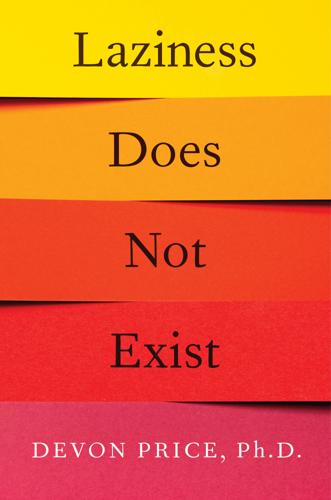
Laziness Does Not Exist
by
Devon Price
Published 5 Jan 2021
Foulkes, Literature and Propaganda (Abingdon, UK: Routledge, 2013), 46. 27. John A. Geck, “Novels of Horatio Alger: Archetypes and Themes,” Cinderella Bibliography, University of Rochester, https://d.lib.rochester.edu/cinderella/text/alger-archetypes-and-themes. 28. Russell S. Woodbridge, “Prosperity Gospel Born in the USA,” Gospel Coalition, June 4, 2015, https://www.thegospelcoalition.org/article/prosperity-gospel-born-in-the-usa/. 29. Megan Garber, “The Perils of Meritocracy,” Atlantic, June 30, 2017, https://www.theatlantic.com/entertainment/archive/2017/06/the-perils-of-meritocracy/532215/. 30. Melvin J. Lerner, “The Two Forms of Belief in a Just World,” in Responses to Victimizations and Belief in a Just World (Boston: Springer, 1998), 247–69. 31.
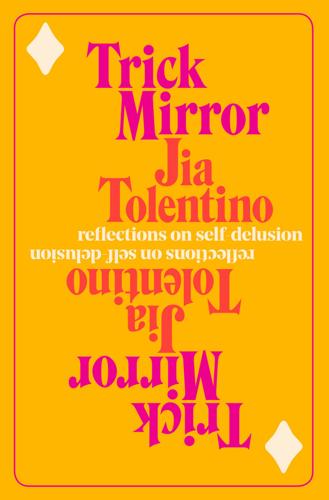
Trick Mirror: Reflections on Self-Delusion
by
Jia Tolentino
Published 5 Aug 2019
But then they moved to Houston, an unfamiliar expanse of looping highway and prairie, and this one pastor’s face was everywhere, smiling at commuters from the billboards that studded I-10. My parents took to his kind, civilized, compelling style of preaching—he was classier than your average televangelist, and much less greasy than Joel Osteen, the better-known Houston pastor, famous for his cheap airport books about the prosperity gospel and his chilling marionette smile. Osteen’s children attended my school, which my parents persuaded to accept me within a few months of us moving to Texas—and to place me in first grade, even though I was four years old. I would regret this situation when I was twelve and in high school.
…
And Christian theology convinced me that I had been born in a compromised situation. It made me want to investigate my own ideas about what it means to be good. This spiritual inheritance was, in fact, what initially spurred my defection: I lost interest in trying to reconcile big-tent Southern evangelicalism with my burgeoning political beliefs. I hated the prosperity gospel, which had taught many rich white Christians to believe—albeit politely, and with generous year-end donations to various ministries—that wealth was some sort of divine anointment, that they were genuinely worth more to God and country than everyone else. (Under this doctrine, as in Texas in general, inequality is framed as something close to deliberate: if you’re poor, that’s unfortunate, because God must have ordained that, too.)
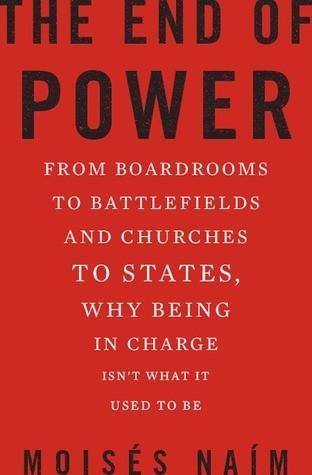
The End of Power: From Boardrooms to Battlefields and Churches to States, Why Being in Charge Isn’t What It Used to Be
by
Moises Naim
Published 5 Mar 2013
But the autonomous churches that have garnered millions of adherents to become a social and political force in the United States, Brazil, Nigeria, and many other countries are not all Pentecostal; they include other kinds of evangelical and “charismatic” groups, each with a typically self-proclaimed prophet or apostle, but quickly forming their own chapters and hierarchies. Many preach the so-called prosperity gospel, which holds that God smiles on the accumulation of wealth in this life and will reward material donations to the church with prosperity and miracles. Indeed, in a recent Pew survey of religious attitudes in the United States, where 50 of the largest 260 churches are now prosperity based, 73 percent of all religious Latinos agreed with the statement “God will grant financial success to all believers who have enough faith.”4 The rise of Pentecostal and charismatic Christian churches, and not just in Catholic or mainline Protestant–dominated countries, has been staggering.
…
Populations, 54, 58, 61, 67, 151, 240 Christian, 196 Portugal, 82, 90, 151 Poverty, 10, 15, 18, 73, 85, 198, 208, 240 decline in, 56 extreme poverty, 55 Powell, Colin, 108 Power, 9, 83 balance of power, 27, 108, 139, 202 barriers concerning, 10, 11, 17, 18, 28–30, 54, 70–74, 134, 231 (see also Barriers to entry) and big size, 34, 38, 52, 75 (see also Bureaucracies) channels of, 23–25, 72 concentration of, 49–50, 213–214, 220, 224, 226, 243 conversations about, 13–14, 233, 234, 237 corporate power, 37, 38, 49, 163, 167, 168, 191, 192 dangers and risks of decay of power, 221–222, 227–232 decay of, 1–2, 5, 12–15, 17–19, 50, 51, 52, 76–106, 121, 122, 127–128, 134, 135, 141, 144, 150, 152, 156, 158, 162, 193, 198, 216, 218–232, 233–244 decoupling power from size, 52 (see also Power: and big size) definition of, 15, 16, 23 distribution of, 17, 27–28, 30, 57, 58–59, 61, 64, 69, 194, 231, 250 economic power, 47, 146, 152, 167 getting/keeping, 11, 16, 35, 72, 75, 121, 130, 158, 163, 172, 217, 236, 237, 244 of individuals, 8 vs. influence, 26–27 innate urge for, 3 market power, 30–31, 31–33, 168–171, 179, 187, 213 measuring, 16–17, 20, 21, 136 micropowers, 13, 17, 50, 51–52, 53, 70, 74–75, 77, 107–108, 191, 196–197, 237 military power, 5, 113, 115, 125, 127–128, 244 moral basis of, 69 political power, 6, 77, 78, 80, 94, 100, 105, 220, 242, 247, 250 shifts in, 1, 13, 27–28, 57, 71, 133, 134, 139, 155, 193, 216, 217, 233, 234, 242 social function of, 17 soft power, 1, 108, 125, 132, 137, 139, 141 talking productively about, 22–23 traditional model of, 71–72 Weber’s theory of, 40 Power Elite, The (Mills), 47 Prepaid phone cards, 63, 66 Prices, 31, 32, 37, 63, 101, 165, 169, 170, 176, 179, 22 price-fixing, 33, 219 share prices, 188 Prince, The (Machiavelli), 15 Princip, Gavrilo, 114 Privacy, 48 Private equity funds, 189 Privatization, 101, 102, 167, 172 Procter and Gamble, 31 Propaganda, 118, 120, 124, 153 ProPublica, 216 Prosperity gospel, 195 Protestant Ethic and the Spirit of Capitalism, The (Weber), 39 Protestants, 197. See also Religion: Evangelicals/fundamentalists/charismatics Prussia, 41 Przeworski, A., 247, 248, 250(fig.) Psy (rapper), 149 Public opinion, 67, 68, 85, 118, 147–148, 156, 227, 239 Pulitzer Prize, 214, 216 Puritanism, 39 Putin, Vladimir, 218 Putnam, Robert, 67 Qaddafi, Moammar, 21, 149 Qaradawi, Yusef al-, 199 Qatar, 149, 216 Quality of life, 56 Quinn, James Brian, 182 Ramachandran, Vijaya, 145 Ramirez, Alejandro, 184–185 Rare earths, 56–57 Reagan, Ronald, 88, 172, 202 Real estate, 24, 27, 118, 218 Recessions, 6–7, 54, 167.
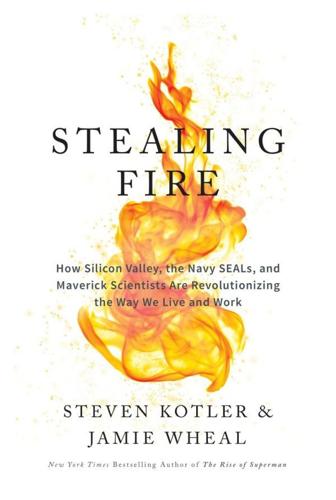
Stealing Fire: How Silicon Valley, the Navy SEALs, and Maverick Scientists Are Revolutionizing the Way We Live and Work
by
Steven Kotler
and
Jamie Wheal
Published 21 Feb 2017
While EST itself made an impact, with almost one million people going through those original seminars, Landmark, the latest incarnation of Erhard’s teachings, boasts corporate clients including Microsoft,14 NASA, Reebok, and Lululemon. Personal development, which only a few decades ago had been mocked and marginalized, has become a credible way to “optimize human capital” at some of the country’s most successful organizations. We hear echoes of these ideas everywhere, from Tony Robbins’s empowerment seminars to the prosperity theology preached every Sunday by megachurch ministers like Joel Osteen. And even though Tolle’s teachings stay remarkably grounded in his own realization, the larger notion that spiritual awareness can bring material fulfillment—that, perhaps, you can have nirvana, a happy marriage, and the shiny new car—helps explain how 11 million fans of Oprah even heard of him in the first place.
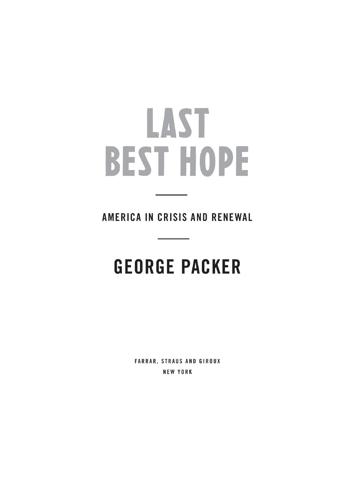
Last Best Hope: America in Crisis and Renewal
by
George Packer
Published 14 Jun 2021
But Trump was a native son, an all-American flimflam man and demagogue, a traditional character of our way of life. Twain would have immediately recognized him. He was spawned in a gold-plated sewer with other creatures of our celebrity trash culture: investment gurus, talk-show hosts, evangels of the Prosperity Gospel, surgery-altered TV housewives, bling-worshiping rappers. His supporters are part of us, too. Yes, I’m aware that we’ve become two countries—but each one continually makes the other. A failure the size of Trump took the whole of America. * * * The year 2020 saw the most flagrant attempt to subvert democracy since Fort Sumter.
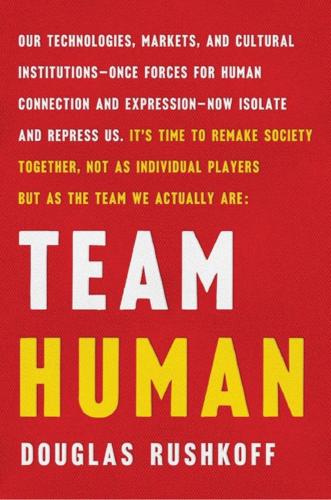
Team Human
by
Douglas Rushkoff
Published 22 Jan 2019
The gifts Dorothy and her companions finally receive from the Wizard merely activate the potentials they had with them all along. All they really needed was a shift in consciousness, but good products and salesmanship didn’t hurt. Similarly, Reverend Norman Vincent Peale’s “positive thinking” derived from occult and transcendentalist roots, but caught on only when he framed it as a prosperity gospel. He taught the poor to use the power of prayer and optimism to attain the good life, and helped the wealthy justify their good fortune as an outward reward for their inner faith. Vulnerable to the same ethos of personal prosperity, the counterculture movements of the 1960s and 1970s originally sought to undermine the religion of growth on which American society was based.
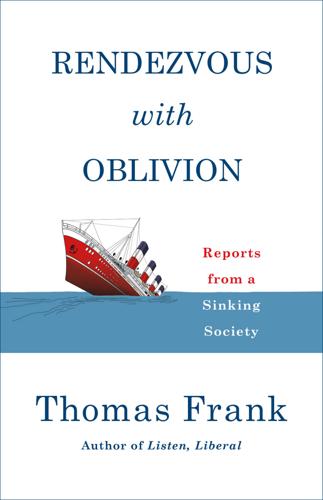
Rendezvous With Oblivion: Reports From a Sinking Society
by
Thomas Frank
Published 18 Jun 2018
They have no idea what to do for places or people that aren’t already successful or that have no prospect of ever becoming cool. And so the dull bureaucrat lusts passionately for the lifestyle of the creative artist, but beneath it all is the harsh fact that foundations have been selling the vibrant, under one label or another, for decades; all they’ve done this time is repackage it as a sort of prosperity gospel for Ivy League art students. As the name of a suburban St. Louis street festival puts it, without the smallest detectable trace of irony, “Let them eat art.” In the face of this deafening silence, allow me to propose a working hypothesis of what makes up the vibrant. It is a quality you find in cities or neighborhoods where there is an arts or music “scene,” lots of restaurants and food markets of a certain highbrow type, trophy architecture to memorialize the scene’s otherwise transient life, and an audience of prosperous people who are interested in all these things.
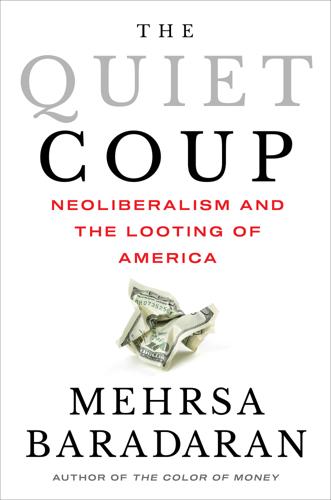
The Quiet Coup: Neoliberalism and the Looting of America
by
Mehrsa Baradaran
Published 7 May 2024
“Abortion is a moral right—which should be left to the sole discretion of the woman involved”; “to equate a potential life with an actual life, is vicious; to advocate the sacrifice of the latter to the former, is unspeakable.”9 She called pro-lifers “hateful” people who were “against the mind, against reason, against ambition, against success, against love, against any value that brings happiness to human life.”10 Republican party leaders and their donors did not share Rand’s moral absolution and thus were happy to oppose abortion rights to take control of everything else. Conservative Christians, meanwhile, had to rewrite practically the entire Bible to justify the greed and immorality of some of the right’s most successful leaders. The Bible is preoccupied with the dangers of greed and even excess wealth. Yet with the rise of the prosperity gospel starting in the 1950s, many Christians have not only excused wealth but transformed it into a sign of God’s favor. Today, the most popular evangelical ministries promise practitioners that God wants them to be rich. The incursion of neoliberal ethics into Christian doctrine has surely done damage to communities of faith by tainting their doctrine as well as their moral authority.
…
of 1896, 189 of 1960, 8 of 1964, 7–8, 15, 19, 24, 185–86 of 1968, 3, 7, 8, 18, 24–27 of 1980, 114, 228 of 1992, 114 of 2000, 114 of 2004, 114 of 2008, 114, 285, 299, 301 of 2016, 114, 319 of 2020, xxiii–xxiv, xl, 114 press, the, 26, 101–2 Price, Ray, 14 price controls, 30, 33, 62 pricing, 201, 204, 233–34 primogeniture, xxix printing press, 274 Private Choices and Public Health: The AIDS Epidemic in an Economic Perspective (Posner and Philipson), 176–78 private enterprise, 25–26, 323 private equity firms, xxvii, 91, 268, 271–73, 278, 300, 307, 323, 348 private law, 174–75 private property, xxx, xl, 44, 53, 190 privatization, xviii, xxvi–xxvii, 55, 60, 128, 216, 322 “Problem of Social Costs, The” (Coase), 171, 210 “Problem of the Negro, The” (Stigler), 22–23 productivity, xxxvi, 231 profit maximization, 84, 215, 239 profit motive, 51 profits, corporate, 57, 79, 84, 220, 237–38 Progressive Era, 129, 189, 232 progressive taxation, 128 pro-life movement, 188 Prometheus Unbound (Aeschylus), 319 Promised Land, A (Obama), 286 property law(s), xxix–xxxi, 172, 209, 220 property rights, xvi, xxix, xxxix, 9, 21, 48, 51, 101, 102, 125, 132–34, 171–73, 175, 205, 274, 276, 330, 341 property taxes, 222–23 prosperity gospel, 189 Proud Boys, 319 pseudo-Darwinian race science, 40–41 psychology, 166, 297 public choice theory, 222–25, 227, 228 Public Citizen, 76 public interest law firms, 88 public law, 174–75 public opinion, 87, 92, 101, 288 public schools (public education), 121, 124, 221. See also school boards Purdue Pharma, xix, xx Quakers, 189 quantitative easing (QE), 295, 298, 299, 311, 312 quotas, hiring, 73, 74 race and racism, xxviii, xxix, xxxiv, xxxvi, 3, 4, 6, 13, 14, 17–23, 25–26, 34, 35, 40–43, 51, 53, 54, 56, 67, 70–72, 77, 95, 100, 101, 106, 120, 122, 127, 175–77, 203, 225–26, 305, 318, 319, 342, 362.
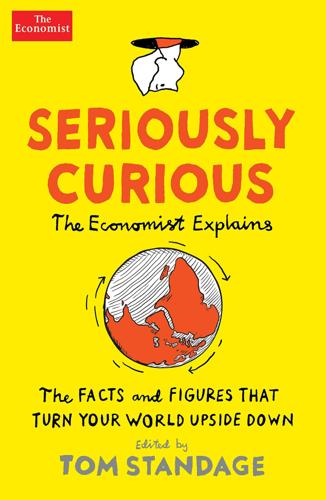
Seriously Curious: The Facts and Figures That Turn Our World Upside Down
by
Tom Standage
Published 27 Nov 2018
Board games also allow Nigerians to focus on something other than the daily wahala, a word for trouble or stress (be it watching the hours tick by in urban traffic jams, appeasing a corrupt policeman or finding the money to keep the family generator running). And in a country where millions of Evangelical Christians follow a prosperity gospel and wealth is often idolised, Monopoly can temporarily allow Nigerians to indulge their fantasies. How drones can keep beaches safe from sharks Australia’s waters are some of the most dangerous in the world. Ignoring, for a moment, the dangers posed by jellyfish and salt-water crocodiles, the average annual number of so-called “unprovoked” shark attacks more than doubled between 1990–2000 and 2005–2015, to 15.
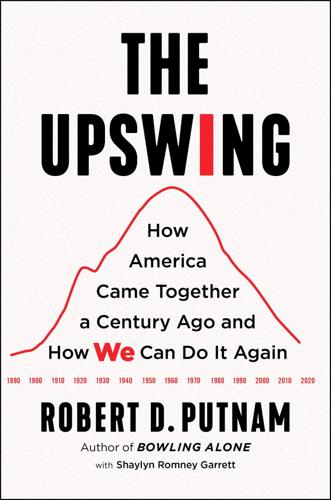
The Upswing: How America Came Together a Century Ago and How We Can Do It Again
by
Robert D. Putnam
Published 12 Oct 2020
The resultant erosion of social ethics was noted even in colonial times, but the full effect of this tendency was not manifest until after the Civil War, when the rise of huge corporate entities began to complicate the moral life of nearly all Americans.… Revivalism tended to become socially trivial or ambiguous to the point of irrelevance. It was precisely these tendencies which made pious Christians like [Walter] Rauschenbusch so harsh in their judgments of evangelicalism.51 Not again until the rapid rise a century later of the “prosperity gospel”—the evangelical argument that personal religiosity leads to personal prosperity—would American religion encompass such a materialistic interpretation of religion’s significance.52 To be sure, denominational diversity has long been great in American religious life. Religious institutions are anything but uniform or monolithic in America.
…
“Church Members in Population: They Would Fill the White States, and Unchurched Would Fill Dark States,” Washington Post, September 12, 1909, cited by Drescher, “Nones by Many Other Names.” These figures, by including children in the denominator, probably slightly understated church membership as a fraction of the adult population. 51 Ahlstrom, Religious History of the American People, 844. 52 A prominent, moderate example of the prosperity gospel is Joel Osteen’s mega-best-seller, Joel Osteen, Your Best Life Now: 7 Steps to Living at Your Full Potential (New York: Faithwords, 2004). 53 The Social Gospel movement and its links to the Progressive movement were far from simple. For more detail, see Ahlstrom, A Religious History of the American People, and Martin E.
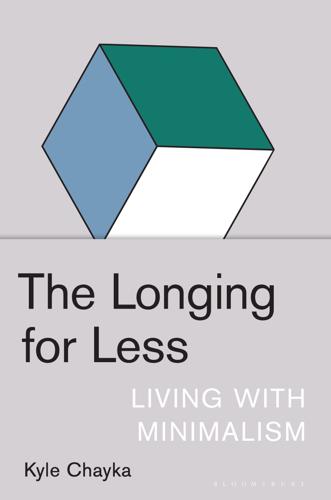
The Longing for Less: Living With Minimalism
by
Kyle Chayka
Published 21 Jan 2020
You can hold on to whichever spark joy. 1 - III The minimalist blogger Joshua Becker, an evangelical Christian and author of The More of Less, published in 2016, proposes Jesus as the original minimalist. When he instructed a rich man to “sell everything you own and give it away to the poor,” the commandment wasn’t about self-sacrifice, according to Becker. It meant that the rich man would be happier without the possessions, so giving them away was a net gain—a kind of minimalist prosperity gospel. Yet the discipline goes back even further. Contemporary minimalism often gets mentioned alongside the ancient Greek philosophy of Stoicism. The school’s founder was something of a minimalist himself, a wealthy Athenian merchant named Zeno of Citium who in the third century B.C.E. decided to forsake his worldly goods for the study of philosophy.
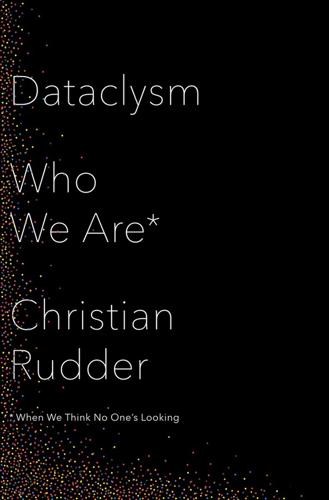
Dataclysm: Who We Are (When We Think No One's Looking)
by
Christian Rudder
Published 8 Sep 2014
Neither Montoya nor Peters1 are all that different from Dale Carnegie, who rebranded himself from the plain “Dale Carnagey” by borrowing the golden surname of the steel magnate Andrew, and who, like these latter-day men, reduced character to bullet points and saw influence above all as the key to success. The goals of personal branding are the same you’d find in any empowerment seminar or in any prosperity gospel sermon from any decade. The end has always been wealth and power. The new part is that “personal branding” asks you to accomplish these ends by treating yourself like a product rather than a human being. Peters again: Starting today you are a brand. You’re every bit as much a brand as Nike, Coke, Pepsi, or the Body Shop.
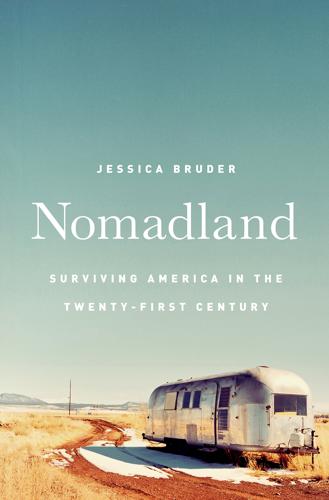
Nomadland: Surviving America in the Twenty-First Century
by
Jessica Bruder
Published 18 Sep 2017
Perhaps you are just sick of the rat race and want to simplify your life. We have good news for you, you can, and we are here to show you how! Linda had discovered CheapRVLiving.com, the creation of a former Safeway shelf stocker from Alaska named Bob Wells. Imagine an anti-consumerist doctrine preached with the zeal of the prosperity gospel—that was Bob’s message. He evangelized living happily with less. One principle underscored all his writings—the best way to find freedom, he suggested, was by becoming what mainstream society would consider homeless. “The key is eliminating the single highest expense most of us have, our housing,” Bob wrote.
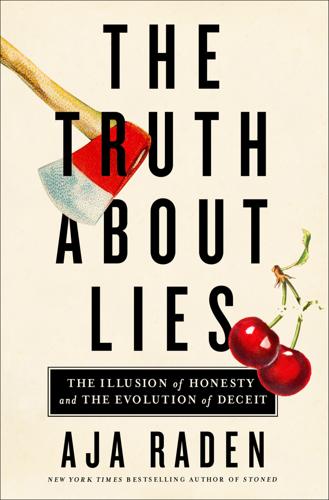
The Truth About Lies: The Illusion of Honesty and the Evolution of Deceit
by
Aja Raden
Published 10 May 2021
The Lakewood Church finally issued a statement claiming they had never closed their doors but also (confusingly) were prepared to open their doors “once the cities and county shelters reach capacity.” When that still wasn’t really good enough for a lot of people, Osteen, who happens to preach the “prosperity gospel” (not a real gospel, for the record), which claims that following his Christian teachings will magically bring greater personal success and wealth, defensively insisted that “this is not just an attack on me, it’s an attack on what we stand for—for faith, for hope, for love.”19 “Jesus even said, ‘When the world hates you, remember: it hated me first.’”
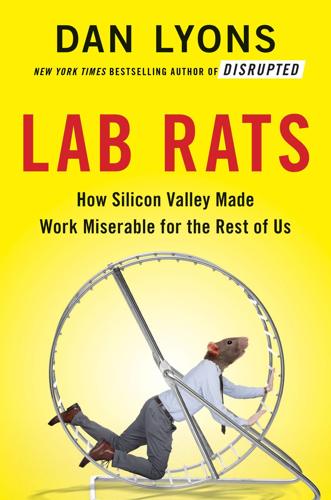
Lab Rats: How Silicon Valley Made Work Miserable for the Rest of Us
by
Dan Lyons
Published 22 Oct 2018
By drawing out Rabois, they exposed the kind of preposterous, egomaniacal assholes who hold power and influence in Silicon Valley, and offered a warning to young entrepreneurs: take money from a venture capitalist, and you’ll end up working for some smug, sarcastic, know-it-all prick like this guy, who will constantly tell you that you’re not working hard enough while he spends his days getting into arguments on Twitter. Do the Hustle Rabois is far from alone in championing workaholism. In 2017 I wrote an op-ed for the New York Times describing how Silicon Valley hucksters had started selling young people on a kind of prosperity gospel in which anyone—yes, that’s right, even you—could start a company and get rich, as long as they were willing to give up their friends and family and personal lives, and work themselves to death. I was prompted to write the article after I came across the craziest start-up story I’ve ever heard.
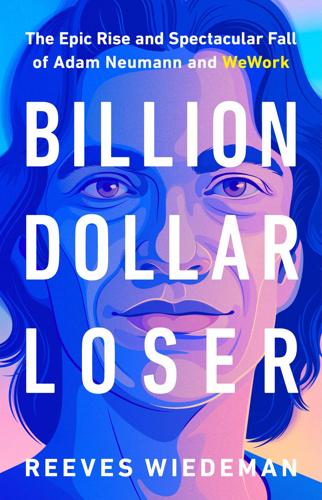
Billion Dollar Loser: The Epic Rise and Spectacular Fall of Adam Neumann and WeWork
by
Reeves Wiedeman
Published 19 Oct 2020
The Bergs opened the Kabbalah Centre in Los Angeles in 1984 and set about expanding their empire with the help of their two sons, Michael and Yehuda. By the late ’90s, the Bergs claimed thousands of adherents to a religion that spoke less about God than it did about “energy.” The Bergs branded Kabbalah as “technology for the soul,” and it manifested as a prosperity gospel rooted in a grab bag of Jewish teachings. During services, men wore white to attract positive energy, and everyone took part in primal, ecstatic singing. At a Kabbalah service in Los Angeles, a Vanity Fair reporter watched as the congregants yelped while pumping their hands in the air. “We’re sending energy towards Chernobyl,” one said.
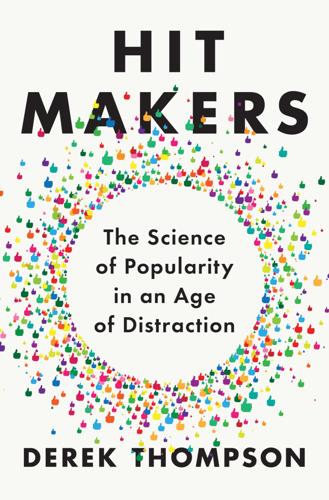
Hit Makers: The Science of Popularity in an Age of Distraction
by
Derek Thompson
Published 7 Feb 2017
Simpson, “If it doesn’t fit, you must acquit,” are memorable yet misleading. But it is precisely because of their musicality that we accept these statements, broadly constructed, as truths. People process the rhyme, and then they seek the reason. For better or worse, this very book belongs loosely to a genre of nonfiction that a critic might call a “gospel of success.” Most of these books resell common sense. The author takes a piece of conventional wisdom that the reader has already intuited and repackages it inside fresh stories. It’s a bit like “intuition regifting”: You already know this lesson, but here it is in new wrapping paper. In Dale Carnegie’s 1936 bestseller How to Win Friends and Influence People, many of the most shared lines are musical, particularly playing with antithesis and chiasmus.
…
“They ask, ‘What were the characteristics of the successful thing?’ and then they decide that all these characteristics must be very special.43 Or they try to find patient zero, the person who started the trend, because they decide he must be very special.” This sort of thinking creates a worthless gospel of success, Watts says. If a dinosaur movie succeeds in May, a thousand articles are written to claim there is something special about the allure of dinosaurs (even if a dinosaur movie just failed in January). If a Belize musician hits it big in 2016, some writers will decide there must be something intrinsically appealing about Belizean music (even if it’s the only Belizean hit of the century).

Fuller Memorandum
by
Stross, Charles
Published 14 Jan 2010
Officially, the Free Church of the Universal Kingdom? Or unofficially . . . ?" She shakes her head. "The Free Church aren't terribly useful over here--the British aversion to wearing one's religion on one's sleeve, you know. We'd get lots of very funny looks indeed if we went around fondling snakes and preaching the prosperity gospel--even though that sort of thing is de rigueur for stockbrokers. No: on this side of the pond we mostly use local Conservative and Unionist Party branches. And some Labour groups, we're not fussy." Enlightenment dawns, and it's not welcome. Firstly, the Tory grass-roots are notorious for their bloody-minded independence--their local branches pretty much run themselves.
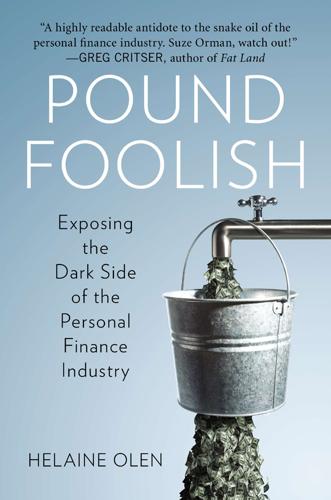
Pound Foolish: Exposing the Dark Side of the Personal Finance Industry
by
Helaine Olen
Published 27 Dec 2012
and “1 on One” segments on her CNBC show, weighing in on people’s desires to do such things as purchase a Porsche (denied) or even the desire to have a second child (also denied). Debuting mere months before the start of the Great Recession, her lectures rebranded Suze as the voice of financial common sense, an über-Jewish mother who tells it like it is no matter how bad the news. Orman, who once preached a variant on the prosperity gospel, telling people that the first step to riches was to think positive thoughts about money, now saw doom and gloom all around us. She blamed consumers for the financial crisis, arguing we were as culpable as the banks. “You bought homes you couldn’t afford. You took equity out of your homes to buy other things you couldn’t afford.

Heaven Is a Place on Earth: Searching for an American Utopia
by
Adrian Shirk
Published 15 Mar 2022
Everyone was standing now, Black, white, brown, queer, straight, trans, cis, documented and undocumented. I felt a deep, sharp shiver run through me to the floor, as I stood, too, already wondering whether I had the right to join in. Even though Jabez was using the metaphor of property, and even though I had previously associated this line of scripture with the prosperity gospel, I could feel us all, communally, in that moment, reinterpreting what it meant. No one in this room meant private ownership when they said, “Enlarge my territory.” Rather, everyone was looking toward a much more expansive idea of the divine commonwealth. Sweeney and I met in college as fresh-faced anarchists, each of us at different but equally unbidden spiritual crossroads.
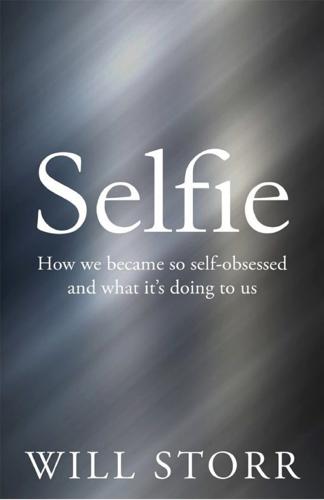
Selfie: How We Became So Self-Obsessed and What It's Doing to Us
by
Will Storr
Published 14 Jun 2017
In 1862 Quimby treated Mary Baker Eddy, who went on to found the Christian Science movement, which located the source of all sickness and misery in the mind. Twenty-six years later, a British-born suffragette named Frances Lord, who’d become entranced with the Christian Science scene on a visit to the US, published what Horowitz describes as ‘the prosperity gospel’. Her book was special in that it included ‘a “treatment” for overcoming poverty. Lord provided a six-day programme of affirmations and exercises to break down the mental bonds of poverty.’ For Samuel Smiles, achievement and wealth had been a product of toil and self-denial. For Lord, all you had to do was believe.
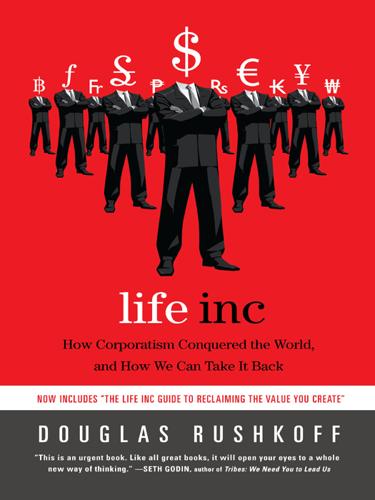
Life Inc.: How the World Became a Corporation and How to Take It Back
by
Douglas Rushkoff
Published 1 Jun 2009
Organized religion well understands the new competitive landscape, and offers its congregations just as much personal success as any self-improvement huckster. The televangelist Creflo Dollar (that’s his real name) blings the word to his followers: “Jesus is ready to put some money in your pocket…. You are not whole until you get your money. Amen.” Dollar may be the epitome of the “prosperity gospel,” which promotes the “total” enrichment of its followers. Megachurches are megacorporations, whose functioning and rhetoric both foster the culture and politics of the free market. Christian branding turns a religion based in charity and community into a personal relationship with Jesus—a narcissistic faith mirroring the marketing framework on which it is now based.
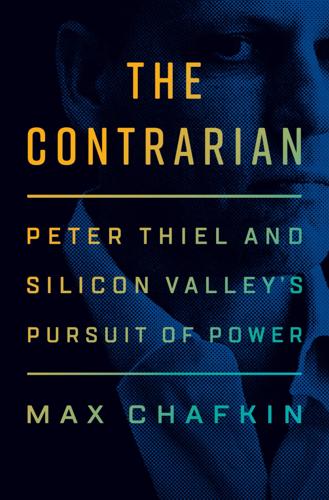
The Contrarian: Peter Thiel and Silicon Valley's Pursuit of Power
by
Max Chafkin
Published 14 Sep 2021
Google was, not unlike Stanford, full of lefty idealists devoted to the company’s lofty mission—“To organize the world’s information and make it universally accessible and useful”—and its vaguely progressive-sounding politics that promised “don’t be evil.” But Google also had a conservative contingent—young college graduates who’d been attracted to the growing company because it paid well, offered great job security, and had the reputation for hiring elite engineers. Many of them were well versed in the blend of prosperity gospel and libertarian politics of Peter Thiel. They’d watched The Social Network, they’d read Zero to One, and they’d cheered on Ron Paul and Donald Trump and the destruction of Gawker. In July 2017, a twenty-eight-year-old Google engineer from the Chicago suburbs, James Damore, circulated a memo arguing that the company had been systematically discriminating against certain employees.

Make Your Own Job: How the Entrepreneurial Work Ethic Exhausted America
by
Erik Baker
Published 13 Jan 2025
Wilson Company, 1933), quotations 7–8. 26“Create Own Work, Vocational Expert Tells Woman of 40,” Washington Post, August 3, 1937, 11. 27“Create Your Own Work,” Independent Woman 18, no. 4 (1939): 105, 123–125, at 124. 28Clara Belle Thompson and Margaret Lukes Wise, “How I Got My Job,” Woman’s Day 5 (May 1940): 14–15, 57–58 at 15; 58. See also Thompson and Wise, We Are Forty and We Did Get Jobs (Philadelphia: J. B. Lippincott, 1938). 29Quoted in Jill Watts, God, Harlem U.S.A.: The Father Divine Story (Berkeley: University of California Press, 1992), 88; see also Kate Bowler, Blessed: A History of the American Prosperity Gospel (New York: Oxford University Press, 2013), 27–29. 30William Jones, “Jobs Many of Us Can Create Ourselves,” Afro-American, June 4, 1932, 6. 31Jones, “Jobs Many of Us Can Create Ourselves.” 32Quoted in Watts, God, Harlem U.S.A., 135. 33E. B. Weiss and Louis L. Snyder, Keeping Young in Business (New York: Whittlesey House, 1934), viii, 133, 136.
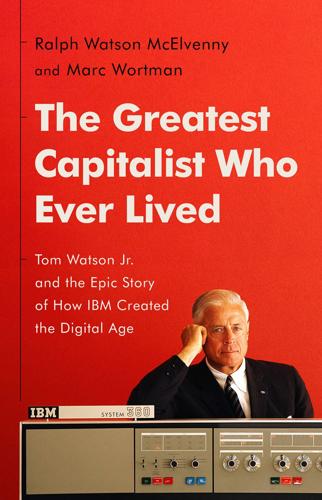
The Greatest Capitalist Who Ever Lived: Tom Watson Jr. And the Epic Story of How IBM Created the Digital Age
by
Ralph Watson McElvenny
and
Marc Wortman
Published 14 Oct 2023
He expected employees not just to look like upright citizens but to live an exemplary homelife—or risk losing their jobs. He also began to see the value in overcoming failure. His early experiences would later become the basis for his optimism in the face of gloomy business forecasts. He would preach a gospel of success that would become as much a part of the future IBM as would its “think” signs. His and his father’s many business setbacks also helped him to see that some men fell through no fault of their own, or that if at fault, they might redeem themselves. He developed a sympathy for the workingman’s challenges that endured as he rose to the top.
…
T.J. insisted, “You must not do anything that’s in restraint of trade… [or act in a way] construed by anybody as unfair competition.” Success in selling CTR’s products would not take underhanded means. “No man,” he declared, “ever won except in the one honest, fair and square way in which you men are working.”27 T.J. Watson rose again from a seemingly career-destroying crisis. His personal faith in the gospel of success stirred the moribund CTR to life. 2 THINK On January 25, 1915, T.J. Watson gave a pep talk to the wary employees at the International Time Recording—the R in CTR—division in Endicott. “We must,” he declared, drawing upon his own recollections of rural life, “all pull together in this business just the same as horses attached to a whippletree.
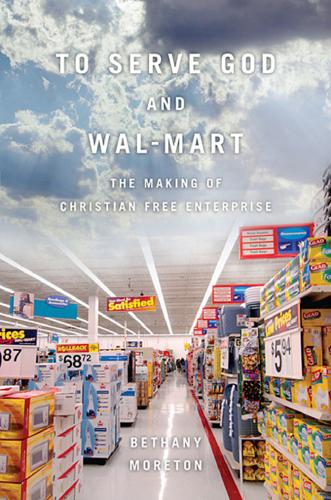
To Serve God and Wal-Mart: The Making of Christian Free Enterprise
by
Bethany Moreton
Published 15 May 2009
For his speech introducing the programs, which educated private citizens in diplomacy through vehicles like Sister Cities and the Christian Children’s Fund, President Eisenhower chose the Southern Baptist Baylor University in Texas.7 To this dynamic tradition of missionary globalism, Christian economic thought in the 1980s added an expansionist bent that was invigorated by its triumph in the Cold War. The New Christian Right’s many Pentecostals often embraced “health-Â�and-Â�wealth” optimism, certain that God rewarded his faithful with ever-Â�increasing abundance. This prosperity gospel was an international movement, linking Christians from Colorado Springs to Kinshasa to Seoul.8 Many evangelicals, meanwhile, saw entrepreneurs as public benefactors who brought the blessing of goods and serÂ�vices to an ever-Â�wider public. “The man who makes the highest Â�profit,” explained the Texas-Â�based Institute for Christian Economics in 1981, “is the man who is best serving the public.”9 Evangelical€ opinion-Â�makers enthusiastically Â�adopted the economic visions of George Gilder and Michael Novak, putÂ�ting a Christian spin on globÂ�alÂ�iÂ� zaÂ�tion.10 Georgia congressman Newt Gingrich, a family values standardÂ�bearer, championed a high-Â�tech, high-Â�growth, expansionist entrepreneurship that condemned trade barriers alongside other big-Â�government intrusions.
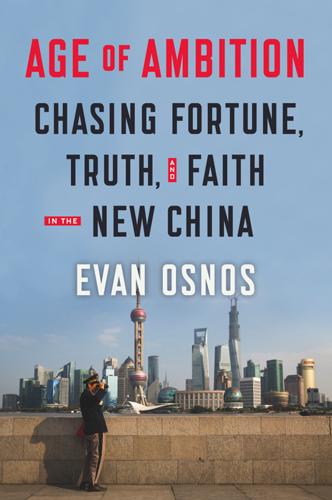
Age of Ambition: Chasing Fortune, Truth, and Faith in the New China
by
Evan Osnos
Published 12 May 2014
Modern Chinese travel, like the modern Chinese state, was predicated on the fragile promise that it would impose order on a chaotic world, by shepherding its citizens and keeping them safe from threats that could include Western thieves, Western cuisine, and Western culture. In the flesh, the West that our group encountered was, indeed, more Europe than “Europe”—unkempt and unglamorous in ways they hadn’t expected. And yet, behind the prosperity gospel about Chinese one-party efficiency, my busmates caught unredacted flickers of insight, glimpses of humaneness and openness and a world once forbidden. By declaring, in effect, an end to the revolution, the Party in Power had hoped that its people would now step beyond politics and get on with living.
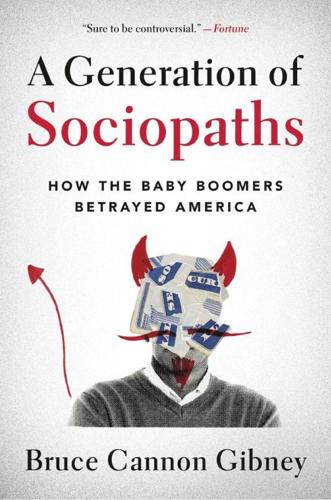
A Generation of Sociopaths: How the Baby Boomers Betrayed America
by
Bruce Cannon Gibney
Published 7 Mar 2017
Ignatius Loyola and thoughtfulness of St. Thomas Aquinas were transmuted into the gold-plated spectacle of Jim and Tammy Faye Bakker. The connection between lucre and salvation, after the long hiatus imposed by Martin Luther, reappeared in the reptilian form of Creflo Dollar and other evangelists of the “prosperity gospel,” which took the metaphor of Malachi 3:10 and made it literal. Tithe a tenth of earnings, and God would “pour you out a blessing, that there shall not be room enough to receive it,” a (tax-exempt) rate of return to which Goldman Sachs can only aspire.40 This new form of worship, genuflecting to God-as-vending-machine, was all the salvation with none of the guilt, a doctrine of consumption instead of charity, individually tailored to the preexisting political beliefs of the congregation.
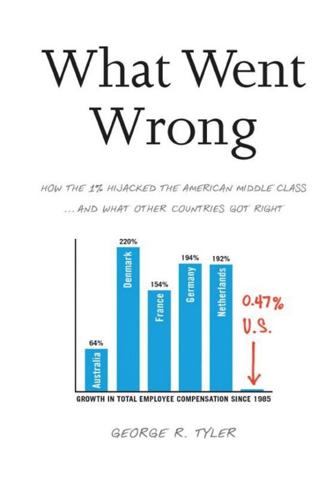
What Went Wrong: How the 1% Hijacked the American Middle Class . . . And What Other Countries Got Right
by
George R. Tyler
Published 15 Jul 2013
,” Washington Post, July 3, 2011. 53 Ahamed, Lords of Finance, 358. 54 Ibid., 436. 55 Nasar, Grand Pursuit, 383. 56 Editorial, “State Capitalism,” Financial Times, February 3, 2009. 57 Robert Skidelsky, John Maynard Keynes: Vol. 2, The Economist as Saviour, 1920–1937 (London: Macmillan, 1994), xv. 58 Robert Shiller, “A failure to control the animal spirits,” Financial Times, March 8, 2009. 59 The orientation is quite at odds with the prosperity gospel with its Randian roots in tracts like Russell H. Conwell’s “Acres of Diamonds,” infusing Reagan-era America. See Benjamin Anastas, “Mammon from Heaven,” Harper’s Magazine, March 2010. 60 Paul Rayment, “There is an alternative to market fundamentalism,” letter to editor, Financial Times, February 9, 2009.
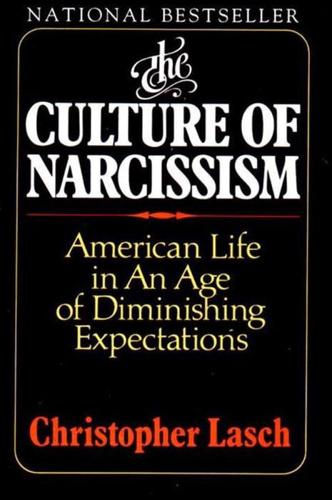
The Culture of Narcissism: American Life in an Age of Diminishing Expectations
by
Christopher Lasch
Published 1 Jan 1978
American Society (New York, Knopf 1970), pp. 454-55. , "The man of ambition . . . underlying mechanisms." Philip Rieff Freud: The Mind cf the Moralist (New York: Doubleday 1961), , , p 372. . 54 273. Cotton Mather A Christian at His Calling (1701), reprinted in Moses Rischin, ed.. The American Gospel of Success (Chicago: Quadrangle Books, 1965), pp. 23, 25, 28; John Cotton, "Christian Calling" (164), reprinted in Perry , Miller and Thomas H Johnson, eds.. The Puritans (New York: American . 44 "visibility," "momentum" Rosabeth Moss Ranter, Men and Women of the'Corporation (New York: Basic Books, 1977),passim; Eugene Emerson Jennings, Routes to the Executive Suite Book Company 1938), p. 324. , 55 (New York: McGraw-Hill, 1971), passim, especially ch. 5 ('The Essence of " 104 ("need to be in control"); 106 ("open to new ideas ; renounce adolescent rebelliousness ); 107 ("illusion of limitless options"); 108 ("pushed around .

Animal Spirits: The American Pursuit of Vitality From Camp Meeting to Wall Street
by
Jackson Lears
The deification of will, the horror of waste, never disappeared entirely; William James was enough of a Victorian to make will the center of his “Habit” chapter in Principles of Psychology. Yet there is no doubt that the self-help literature of the Gilded Age revealed a subtle change in emphasis, from hard work to high spirits. Animal spirits became a central theme in this emerging gospel of success. They were a means for reaffirming the celebration of the self, which (some said) had been disdained too long due to inherited puritan habits of mind—particularly the remnants of the doctrine of original sin. “What looks like self-conceit may be after all only the overflow of animal spirits,” the Staunton (Va.)

The Color of Money: Black Banks and the Racial Wealth Gap
by
Mehrsa Baradaran
Published 14 Sep 2017
Although Garvey irritated prominent black leaders, his economic road map bore a striking resemblance to Washington’s own rhetoric—Garvey was inspired by Washington’s philosophy, and the two had corresponded and intended to meet before Garvey immigrated to America, but Washington died before they could meet. Garvey enthusiastically embraced capitalism and preached a gospel of success that included self-mastery, hard work, and selfsufficiency, all of which he promised would result in black wealth and power. He echoed Andrew Carnegie when he admonished black Harlem: “Be not deceived, wealth is strength, wealth is power, wealth is influence, wealth is justice, is liberty, is real human rights.”89 Blacks needed to own “more stores, more banks, and bigger enterprises,” said Garvey.
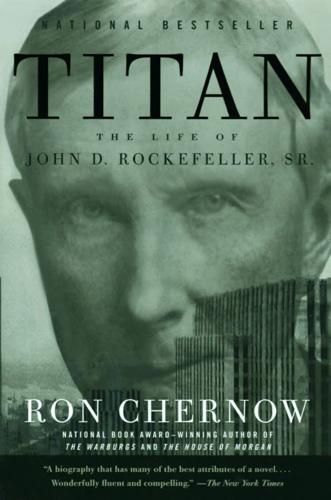
Titan: The Life of John D. Rockefeller, Sr.
by
Ron Chernow
Published 1 Jan 1997
Oddly, Rockefeller felt guilty about the raise: “I felt like a criminal.”44 Again, one has a hunch that he was jubilant but feared, out of religious scruples, his own greed. Accumulating money was one thing, Rockefeller knew, but outwardly coveting it was another. In many ways, John D. Rockefeller exemplified the enterprising young businessman of his era. Thrifty, punctual, industrious, he was a fervent adherent of the gospel of success. He could have been the hero of any of the 119 inspirational tracts soon to be penned by Horatio Alger, Jr., books that bore such sonorous titles as Strive and Succeed, Luck and Pluck, Brave and Bold, and Bound to Rise. This last title, in fact, echoed Rockefeller’s ecstatic boast to an older businessman one day: “I am bound to be rich—bound to be rich—BOUND TO BE RICH!”